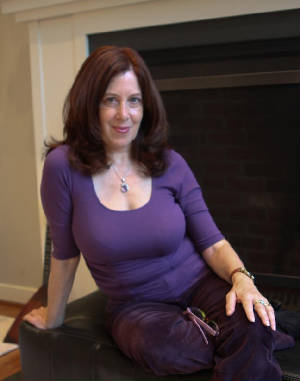
|
| That's me, Pattie Weiss Levy. |
A Modern-Day "Ima" on a Modern-Day Bimah
(With
new content posted every WEEK!)

|
|
Thursday, September 1, 2011
A
Word From the Weiss
 “Better safe than sorry,” people keep saying about the extreme precautions taken last weekend during our harrowing
run-in with Hurricane Irene… as if it were an either/or situation. I guess I should be counting my blessings that my
family ended up without any bodily injury or notable property damage. We didn’t even lose power. We ended up safe indeed. “Better safe than sorry,” people keep saying about the extreme precautions taken last weekend during our harrowing
run-in with Hurricane Irene… as if it were an either/or situation. I guess I should be counting my blessings that my
family ended up without any bodily injury or notable property damage. We didn’t even lose power. We ended up safe indeed.
Yet I still feel sorry.
Very, very sorry.
And in keeping with the typical
Jewish mother’s approach to mess-ups, mix-ups and all those other things that we regret, I can’t help feeling
that I have mostly myself to blame.
Given the frantic tenor of weather reports, it seems a little crazy in
retrospect that my husband and I didn’t abort our plans to spend last weekend visiting New York City. But given the
track records of most meteorologists, preliminary storm warnings failed to put the fear of God in us. Besides,  Saturday was a momentous occasion for our family. It was our son’s 25th birthday. We wanted to see him and deliver his
gifts in person. Since life for us lately has had more than its share of stress, tsuris, aggravation and angst, we
welcomed having something nice to celebrate for a change. So wild horses -- let alone the combined chorus of Weather.com,
CNN, and Chicken Little shrieking that the sky was falling -- couldn’t have kept us away. Saturday was a momentous occasion for our family. It was our son’s 25th birthday. We wanted to see him and deliver his
gifts in person. Since life for us lately has had more than its share of stress, tsuris, aggravation and angst, we
welcomed having something nice to celebrate for a change. So wild horses -- let alone the combined chorus of Weather.com,
CNN, and Chicken Little shrieking that the sky was falling -- couldn’t have kept us away.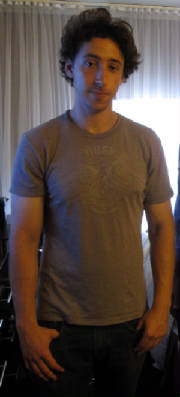
Neither was I remotely dissuaded by my son’s admonitions that he might not even have time to see us
while we were there. Since extricating himself recently from an onerous work assignment, as I detailed in this space two weeks
ago, Aidan has continued to find steady employment in TV and film. This included serving briefly as the props master on a
music video for the hip-hop artist Usher (which he explained to me patiently, as if I might not understand that this was not
someone who escorts people to their seats in a theater, or might not be able to distinguish between Lady Gaga and Lady Di).
Then late last week, he began a month-long stint as the set dresser on a movie starring Kirsten Dunst, perhaps best known
as the love interest in all three Spider-Man films.
Tentatively titled The Bachelorette, this new comedy is about three women who return to their hometown to be bridesmaids for a girl they called
"Pigface" in high school. But working there was proving to be no romantic romp for Aidan. His new boss turned out
to be a short-fused, manic micro-manager who scrutinized his every move and expected everyone to run when anything
needed to be done. Also, typical of the film industry, shooting hours were long and extremely unpredictable. So he did his
best to discourage me from making any plans revolving around him.
I remained undeterred, however, and decided
to take my chances. Assuming that he would far prefer to spend the evening of his actual birthday carousing
with his peers (people who can easily identify all of the above-mentioned performers and probably lip-sync their latest
hits), I figured it would make most sense for us to take him out on Friday.
I also decided it would be nice to follow up a festive dinner out by seeing a play. Yet in deference to his
warnings that he might be unavailable, I decided to forego buying tickets to a pricey Broadway production in favor of a series
of one-act plays at 59E59, an off-Broadway theater we frequent.
As an aspiring screenwriter, Aidan loves one-acts
and has even had two of his own produced in conjunction with a theater festival in New York. The tickets were only $18 apiece,
a sum I was well-prepared to risk. And given that the production featured four separate works by different contemporary playwrights,
if he were delayed and had to miss the beginning, he’d still be able to enjoy the rest of the show.
But first would come the birthday
dinner, a festive meal indeed. OpenTable.com, the Web site that allows you to make restaurant reservations online, indicated
that NYC Restaurant Week had been extended until September 5. This citywide promotion offered special menus at participating
restaurants, with lunches priced at $24.07 and three-course dinners for $35 apiece.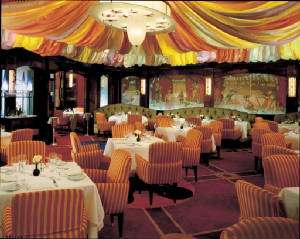
The option closest to the theater, which is named for its address on East 59th Street, was Le Cirque, a renowned French eatery
we had never tried, given its hefty prices. Why, appetizers alone there customarily ranged from $21 for a simple salad to
$195 for caviar. But the occasion called for somewhere special. And the many choices on its $35 menu sounded divine.
So I tried not to be too crestfallen
when Aidan texted me the night before. He’d learned that he was going to have to work late on Friday night after all,
and wouldn’t be able to join us. “I just sold my soul to the film industry,” he wrote.
“No, just your body,”
I wrote back, trying to keep it light-hearted. But my heart was anything but light. Why had I gotten my hopes up and taken
such pains?
I consoled myself by keeping in mind that far more important than our evening out was
what he’d do on Saturday night with his friends. Unfortunately, typical of many young people, Aidan had neglected to
schedule anything, preferring to wait until the last minute. Never mind that his birthday fell on one of the last weekends
of the summer, and that by the time he started calling around, many people were likely to have made alternate plans.
Yet ironically, he was the one who ended up with alternate plans of his own. As my daughter divulged, a girl
Aidan knew (but whom we were not supposed to know about because he presumably was dating her) offered to cook him dinner that
night. And he evidently accepted, without mentioning that it was his birthday. Personally, if I were cooking dinner for someone,
particularly someone I was dating, I’d want to be privy to such information. But as I’ve often noted here,
my son is not someone who toots his own horn, let alone mentions his birthday. He’s modest and unassuming to the max.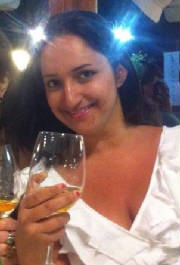
His birthday, also, is not something that he has ever truly relished. I’m not suggesting he’s
a party pooper, but neither is he a party animal (unlike his ultra-sociable sister, who seems to begin planning her next birthday
celebration the morning after the last). He also learned at too early an age that having birthdays can be bitter as well as
sweet.
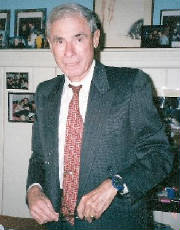 The summer that he turned 12, a
sensitive age if there ever was one, was one that haunts us all to this day. My father died late that July, after nearly a
year grappling with a terrible illness. Four weeks later, my mother-in-law took a fall and broke her neck. She clung to life
for a week in the hospital before dying too. We were obliged to hold the funeral two days later. Right on Aidan’s twelfth
birthday. The summer that he turned 12, a
sensitive age if there ever was one, was one that haunts us all to this day. My father died late that July, after nearly a
year grappling with a terrible illness. Four weeks later, my mother-in-law took a fall and broke her neck. She clung to life
for a week in the hospital before dying too. We were obliged to hold the funeral two days later. Right on Aidan’s twelfth
birthday.
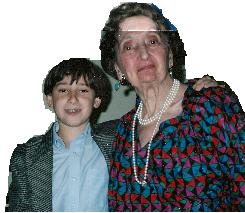 As terrible as it may sound, we
chose to light candles on a cake for him that night. Rather than doing it in a house of mourning, we went out onto the deck
in the back yard. I still remember flushing with embarrassment, mortified when several people arrived to make a condolence
call just in time to find us gathered around a flaming cake out back singing “Happy Birthday.” As terrible as it may sound, we
chose to light candles on a cake for him that night. Rather than doing it in a house of mourning, we went out onto the deck
in the back yard. I still remember flushing with embarrassment, mortified when several people arrived to make a condolence
call just in time to find us gathered around a flaming cake out back singing “Happy Birthday.”
Only after we’d finished
sitting shiva (the requisite Jewish seven days of mourning) did it occur to me that a child of his age should have
something nicer than that to mark the occasion. “Honey, is there any kind of a party you would really enjoy?”
I asked him.
Actually, there was, he replied earnestly. He wanted to have a movie party with both boys and girls, and
he knew just the film that he wanted to see. It was something called There’s Something About Mary.
“That’s wonderful!” I replied, relieved that he didn’t simply argue that the moment
had passed. He immediately began phoning to invite all of his friends, most of whom were former classmates from the Jewish
day school he’d attended through fifth grade.
Having been in a fog for that entire summer, between my father’s
illness and my mother-in-law’s abrupt demise, I had no idea what this film was, nor that we were about to become subjects
of ridicule and horror, pariahs among most of the parents we knew.
In fact, only years later did I find out just how inappropriate this raunchy, R-rated comedy starring Ben
Stiller and Cameron Diaz was for nice Jewish pre-adolescents. After all, my husband chaperoned them in the theater while I
took my daughter, who was only 8 at the time, to a Disney film instead.
Come to think of it, Aidan probably has no sense
of embarrassment attached to that memory. Among his friends, he ended up being something of a local hero, a pint-sized Judah
Maccabee among prepubescent movie-goers, since the only reason any of them got to see something so rife with graphic sex and
masturbation scenes was that people felt so sorry for him and for us that they were hesitant to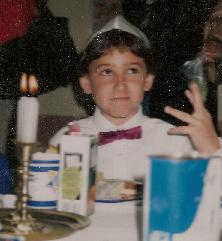 speak up and make a stink -- except for one extremely strict father, who tried to humiliate his 12-year-old son by insisting
that he join my daughter and me at the Disney film instead. (But never fear, in case you're wondering,
I let that poor boy go with his buddies to the raunchy film and took the flack for it afterwards.) speak up and make a stink -- except for one extremely strict father, who tried to humiliate his 12-year-old son by insisting
that he join my daughter and me at the Disney film instead. (But never fear, in case you're wondering,
I let that poor boy go with his buddies to the raunchy film and took the flack for it afterwards.)
On the other hand, the sad truth
was that suffering a double loss at such a tender age -- his first family death ever, multiplied by two within a month --
left him devastated and downhearted and seemed to tarnish his attitude toward birthdays for life. Even his bar mitzvah,
held exactly a year later, was unavoidably marred by the absence of two key people who should have been there.
So I can’t tell you how distressed
I was when Aidan texted me on Friday morning to report that he not only was going to have to work late on Friday, but
now was shooting through the entire weekend. Along with foregoing our family plans, he’d have to cancel that home-cooked
birthday dinner with the girl who didn’t know it was a birthday dinner.
I wrote back suggesting that he dare to inform his maniacal boss that he was turning 25 on Saturday,
and ask if there were any chance that he could get off that night a little early. After all, he had only been hired two days
before and already had made plans by then. He hesitated to ask, but finally got his nerve up to say that his parents were
coming in from out of town for his birthday (which he believed sounded a little more compelling than his having dinner
with a girl). The man replied noncommittally, saying only that he’d see what he could do.
Meanwhile, dire reports about the approaching hurricane continued to pour in. Irene was now expected to hit
New York head-on, so hard that it was threatening to turn the Big Apple into applesauce. This motivated Mayor Michael Bloomberg
to take the unprecedented measure of decreeing that all subways and buses must be shut down by noon on Saturday.
As terrible as this news was for
the city at large, there was a silver lining for us. Without public transportation, the film crew would have no way to get
home on Saturday, so shooting had to be canceled for that day. In fact, they were intending to also wind up early on
Friday. “I’m now getting off at 5,” Aidan texted me early that afternoon.
Eureka! Miraculously, he would
be able to join us for the evening after all.
Or not. “Schedule change,” he wrote two hours later.
“I can’t go to any of it. Working till 8:30.”
And so we were right back to square one.
No, things weren’t even at square one. With the buses and subways shut down, the girl who was cooking
the non-birthday dinner had now been obliged to cancel, too. Also, most restaurants would be closed, and no friends would
be able to meet him.
Maybe I should have reconsidered our wonderful dinner reservations then and there. But I figured that
my husband, daughter and I still needed to eat near the theater. And maybe, just maybe, my son’s schedule would
be reversed yet again.
How awkward to have alerted the restaurant that we were celebrating a big birthday,
then arrive without the guest of honor. As a waiter whisked away the extra place setting as deftly as a magician making a
rabbit disappear, he also pulled the rug out from any remaining sense of joy about this occasion I’d felt.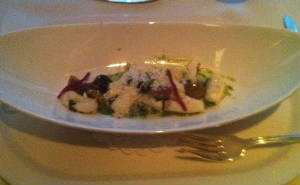
It may seem delusional for me to try to elicit any sympathy for our having to spend the next 90 minutes or
so downing some of the most impeccable French food I’ve ever tasted or viewed, while an overly attentive wait staff
fawned over us, instantly removing emptied plates and replacing used utensils as if by mental telepathy. But believe me when
I tell you that the more delectable and exquisitely arranged each course proved to be, the sicker at heart I felt.
It also was hard not to envy the heavily Botoxed socialite sipping what looked
like pink Champagne next to us with her own grown son (or was it her own underaged gigolo with geriatric tastes?). Not to
mention the starry-eyed young couple seated on our opposite side, who, celebrating a birthday of their own, saw fit to
order almost every dessert on the menu, from chocolate soufflé to creme brulée, and then only take
a taste or two of each.
I could only enjoy the experience in any small way by imagining that my
son would come back to this place the following week, perhaps with that girl in tow, and enjoy the meal we had just devoured.
And now we would be able to clue him in on what to order, telling him to opt for the Ricotta Gnocchi with Escargots appetizer
over the Saffron Linguini with sardines, zucchini and mint, as well as to select the Skate á la Grenobloise with capers
in a lemon beurre blanc over the Chicken Ballantine with corn, arugula and maitake.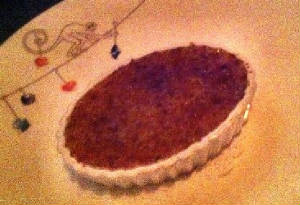
With that in mind, I asked for a copy of the special menu to take with us as we left, planning to give it to Aidan if and when
we saw him the next day. I would even offer to pay for this dinner. But I knew perfectly well he would neither follow through
nor accept.
En route to the theater, I texted him that we would leave his ticket at the box office, in case he got off
on time and weren’t too tired. But with shooting canceled for the next day, he now had to work even later than planned.
Besides, he added, “I’m beat.” And when the final curtain came down, his seat, to no one’s surprise,
was still empty.
By the time I awakened on Saturday,
the city sky looked as gray as soot and a steady rain had begun to fall. Across the room, I heard my cell phone begin to vibrate.
“Happy birthday!” I exclaimed into it a little too cheerily.
“Happy?” Aidan replied. “Seriously?
Let me tell you what happens on my birthday. My grandmother dies and hurricanes hit.”
I barely stifled an apologetic
sigh. “Oh, honey, that’s only two out of 25 of them,” I said. “You’ve also had plenty of good
ones, and I promise you’ll have many more.”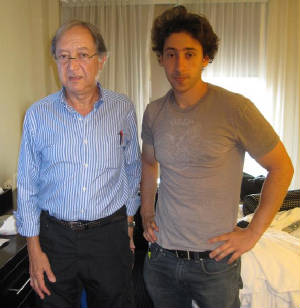
“Eh,” he replied, sounding unconvinced. “Don’t worry about it. Maybe in some perverse
way this means that I’m slated to have a good year.” As for the coming evening, as I’d feared, he still
had no plans. With public transportation shutting down at noon and the mayor urging residents to evacuate many portions
of the city, most of his friends were fleeing New York for the safety of their parents’ homes in the suburbs.
There remained a chance that one
would later walk to meet him somewhere, but that hinged on how bad the rain and wind became. Weathercasters were predicting
potential giant tidal waves and urging people to stay off the streets.
At least he readily accepted our invitation to meet for breakfast. But this morning meal provided nothing
suitable to sing over – his spinach and goat cheese omelet didn’t seem like a plausible anchor for a
birthday candle, let alone 25 of them – and the prevailing mood at the table seemed strangely sour, far more appropriate
for a bout of plague than a 25th birthday bash.
Thankfully, he seemed genuinely delighted about his many gifts, even if most of them were things that he’d
asked for, and utilitarian ones at that: a pair of professional-quality electric drills that he needed for work (never mind
that “Jewish men with power tools” remains my favorite example of an oxymoron); assorted other devices and
a sturdy bag to transport them in (ditto); a first aid kit (see parenthetical remarks above); and a handsome Italian cotton
shirt (being not only a nice but a fashionable Jewish mom, I prefer shopping at stores that have neither the words "home"
nor "depot" in the title).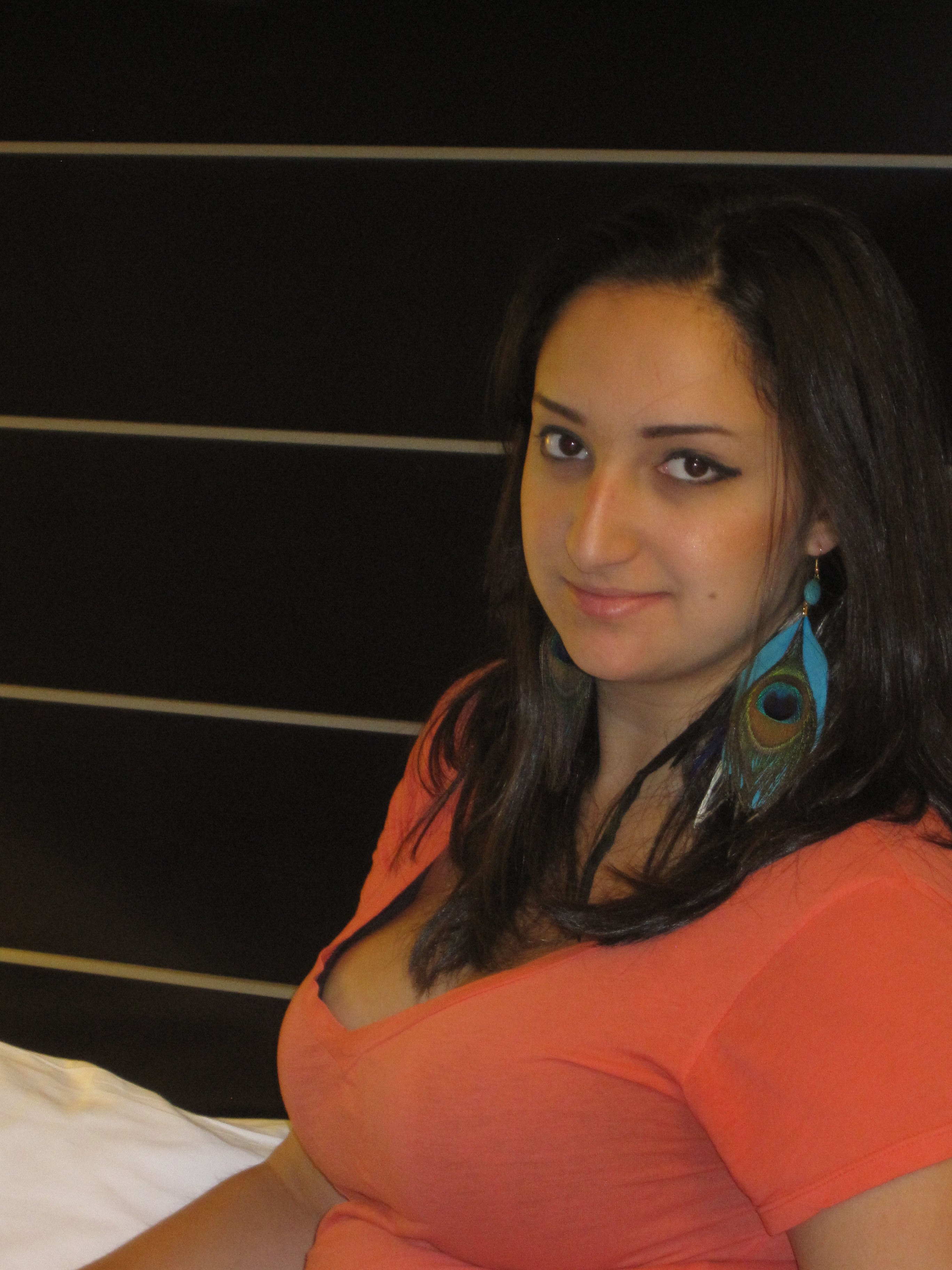
When we drove over to his apartment to drop these many items off, our daughter offered to stay overnight
and celebrate his birthday with him. At 21, she idolizes her older brother and would have been thrilled to do it. He declined
this proposal decisively, however, and she didn’t want to be pushy and persist, so we deposited her at her own place
on Roosevelt Island, where she'd remain until the storm had passed.
As for our own plans, we had already
felt compelled to check out of the hotel a day early. The city was closing bridges by late afternoon, we didn’t want
to risk driving home through heavy rain and gale-force winds on Sunday, and we couldn’t risk getting stranded in the
city. My husband needed to be home for work bright and early on Monday.
When we called later that night, it turned out that none of Aidan’s friends had proven to be available.
A young man subletting one of the rooms in his apartment for the summer had insisted on taking him out to dinner. Reluctant
to let this fellow go to great expense, though, Aidan had declined his suggestion of a nearby sushi place in favor of a local
diner. Afterwards, this young man had gone to stay at his girlfriend’s place.  Their only other roommate was out of town. Aidan spent the night home all alone reading a book. Their only other roommate was out of town. Aidan spent the night home all alone reading a book.
My heart ached to hear it. But he said that he didn’t really mind and planned to turn in early. He was still totally
exhausted from working late the previous day.
My husband and I proceeded to spend countless hours securing the patio furniture and picking up everything
sitting on our basement floor, since local authorities were now predicting that the hurricane might cause flooding. Then we
stayed up until 2, searching CNN desperately for any news or views of New York, where the potential tidal waves were now deemed
apt to surge as high as12 feet. Had we made a grave error to leave our children behind? I was so keyed up that I could
hardly sleep all night.
So it was both a huge relief and enormously exasperating to find that in the end
there were no tidal waves in New York. That the subways and buses could have remained safely in full operation. And that despite
all that hoopla and grim warnings about doomsday scenarios, there was little more than heavy rainfall at home.
I also was left feeling that perhaps
my husband and I had succumbed too readily to predictions of doom and gloom. Maybe we should have stayed another night in
New York and found a restaurant that was open for a nice family dinner. Although, as I’ve noted, no one really wants
to spend their 25th birthday hanging out with their geezer folks.
As for Aidan, the next night my daughter and his good friend Kris took him out for a belated birthday dinner,
although once again, to spare them any major expense, he chose a modest place called Patsy’s Pizza. (I have nothing
against pizza, of course, other than that it isn’t all that special and it doesn’t hold candles well, either.)
He still has no plans to mark that birthday, to my knowledge. And now it's already September. Maybe he feels the moment really
has passed.
The thing that irks me most is that he ended up being let go from that Kirsten Dunst movie the following
day. The ornery boss told him that they needed someone with more experience with power tools (a Gentile, perhaps?). This came
as an enormous relief to Aidan, since the guy had continued to follow him around relentlessly and watch his every
move like a hawk. The better news is that he instantly was hired at much higher pay to work on The Good Wife,
the popular TV show starring Juliana Margulies, instead. (She’s not just Jewish. She’s hot!) But all I could think
was, “If that ogre was planning to let him go, couldn’t he have done it a bit earlier, in time for him
to have joined us for that great meal and the plays?
Here's the thing: Like
most parents, I'm ready and willing to do almost anything to make my children happy, and I desperately want things to
work out for them. But we can't make our children happy. And things don't always work out for anyone.
Life does have more than its share
of unfortunate or even catastrophic occurrences, like grandmothers dying suddenly and hurricanes wreaking havoc. And sometimes
those calamities manage to derail our best-laid plans, by coinciding with birthdays or other blessed events. (As unnerving
as my son’s situation was, a friend told me of a wedding in New York last Saturday night that had to be moved at
the last minute to a totally different restaurant. And no doubt there were other weddings that had to be postponed altogether.)
Yet clearly all those considerations pale drastically in comparison to the many people who suffered
serious consequences due to Hurricane Irene or even lost everything. According to the latest reports I’ve
heard, 43 people died in the storm, 3 million are still without power, and an estimated $7 billion of damage was done, including
the total destruction of many homes. Those, I realize, are the real hardships.
Then again, you only turn 25 once. So I hope my son will still plan something genuinely special to celebrate his birthday. There’s no statute of
limitations on eating birthday cake, as far as I know, and let's hope there never will be.
For just as we all need to take
the bad with the good in life sometimes, it’s no less important to remember to take the good with the bad too. I hope
my son soon learns that. After all, he’s only 25. Surely he has plenty of birthdays left… and plenty of good
ones, too.
12:18 am
Wednesday, August 24, 2011
A Word From the Weiss
I love my neck.
No offense to Nora Ephron, who is among my literary idols and who managed to get a whole book out of hating
hers, but I’m perfectly content with the state of the channel between my chin and my chest. After
all, it isn't all that wrinkled, really (relative to some other women of my vintage, at least), it doesn’t hurt, and
it pretty much does the job of making sure that I have a good head on my shoulders, not to mention, when appropriate, lets
me hold my head up high.
It’s also the one and only neck I’ll probably ever have, and I’d
just as soon save it. So when two out of two doctors who examined me earlier this summer suggested that I might need surgery
in that general vicinity, it bent my neck out of shape. Given my nature, I also felt anxious, angst-ridden, reluctant, unconvinced
and eager to seek a third opinion.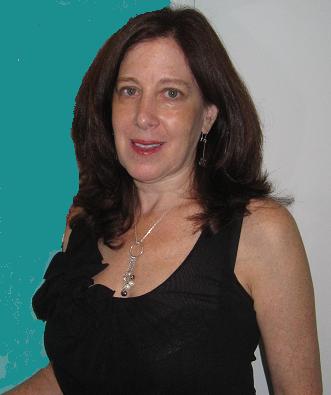
Their source of concern wasn’t actually my neck, per se, but something housed inside it. As I divulged in this space
back in June, it all started during my annual physical exam in January, when my internist noticed a nodule in my thyroid.
However long this knob may have been loitering there, it had never caused any discernible symptoms or otherwise made its presence
known. And despite having discovered it now, my doctor evinced little concern. But from then on, just knowing it was there,
it began to unnerve me.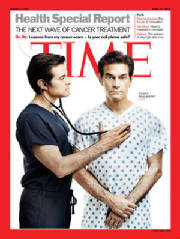
My fear only heightened when a friend mentioned that she’d read in a magazine that thyroid cancer was
the fastest growing variety of newly diagnosed malignancies in the country. So when I began to feel strange tingling
sensations in my neck soon after (possibly stimulated by my poking around in that region trying to feel the alleged nodule
myself), I decided to have it checked out.
An ultrasound revealed that I had not one, but two nodules in there,
one of which was sizable enough to prompt my doctor to send me for a fine-needle biopsy. This barbaric procedure, which required
several needles to be plunged into my neck, was about as pleasant as it may sound, if not less so. So when the results yielded
some "atypical" cells, and my doctor suggested that I might as well just get my thyroid removed entirely –
rather than continuing to undergo this torturous medical procedure every six months for the rest of my life, which he surmised
would be necessary – I decided to consult a specialist.
Doctor No. 2, the head of endocrinology at a local hospital, was a little less dire in his diagnosis. He
didn’t believe that I had cancer, and assured me that even in the event that I did, most forms of it were about
99 percent curable. “You’ll lead a long, happy life,” he proclaimed.
He then chose to put me on a low
dose of Synthroid, a synthetic thyroid hormone, hoping it would prevent the nodules from growing and might even cause them
to shrink.
Even so, just to be sure, he wanted me to consult yet another doctor. He thought I should consider having
a full-fledged biopsy performed on the nodules, or maybe even have them removed – both of which are procedures that
would require making an incision somewhere on my neck. So he referred me to a respected local surgeon who specializes in the
thyroid gland.
This woman is in such demand that the earliest appointment I could secure was two months later. The endocrinologist
had predicted that this might be the case and had offered to intervene on my behalf to have the appointment moved up earlier.
Yet when I called his office to report the distant date I had secured, I never heard back… to my enormous personal
relief.
Of course, some people might not have wanted to go through the whole summer with uncertainty hanging over their heads. “Some
people” is a group that distinctly includes my husband, who nagged me repeatedly over the ensuing weeks to contact one
or both of these physicians and find out what was holding up the works. He wanted me to put some closure to our angst. But
I far preferred uncertainty over certain doom. I had my own idea about this.
My idea was that I would try get
through the whole summer before anyone else got another gander at my (goiter-free) throat and had a chance to send me
for surgery. After all, there were several important upcoming events – including my daughter’s many recent out-of-town
singing engagements -- that I looked forward to eagerly and didn’t want to risk missing. I feared that the need to spend extensive
time recovering after surgery might prevent me from traveling. I also worried that the incision might leave me so
disfigured, at least initially, that I would hesitate to appear in public or be too self-conscious to truly enjoy myself
doing so.
Sorry to be so pathetically vain and insecure about it. I know I should be worrying much more about my health
than something as relatively insignificant as my appearance. But I’m not just a nice Jewish mother, I’m also a
woman, and in all honesty I’d rather not walk around having people openly staring at my neck or, just as bad, doing
their best not to stare at it.
And before you start shaking your head or lecturing me about values and
shameless vanity and what’s important in life, please try to be honest with yourself about this for a second. You shouldn’t
expose a fresh scar to strong sunlight, and there’s something not quite as much fun about going to the beach all bundled
up, or playing tennis in a turtleneck.
As for vanity, as the afore-mentioned Ms. Ephron readily acknowledges, even the most noble and virtuous among
us are likely to succumb to self-consciousness and self-loathing in the face of having an unsightly gash in such plain sight.
As she notes in I Feel Bad About My Neck, “even if you are being operated on for something serious or potentially
serious, even if you honestly believe that your health is more important than vanity, even if you wake up in the hospital
room thrilled beyond imagining that it wasn’t cancer, even if you feel elated, grateful to be alive, full of blinding
insight about what’s important and what’s not, even if you vow to be eternally joyful about being on the planet
Earth and promise never to complain about anything again, I promise you that one day soon, sooner than you can imagine, you
will look in the mirror and think, I hate this scar.”
(It’s hefty mouthfuls of words like that which help me to fully understand how she got to
be regarded as one of the funniest, frankest and most brutally candid writers of our time… and how
she managed to get a whole best-selling book out of complaining about her neck, when I’m pushing it to expand this into
a single blog entry. Also, I mean no offense whatsoever to the many women who have come forward since I first wrote about
this issue to tell me about their own surgery and assure me that the scar fades fast and they’re perfectly fine with
half a thyroid, or none at all. But in my heart, I know that she’s right.)
And so I hoped to delay having
the procedure until cooler weather had arrived in the fall, and I could more comfortably conceal any telltale marks with high-necked
clothing or a variety of attractive scarves.
I had no delusions that I might manage to circumvent having the surgery entirely. I figured that when you
go to consult a surgeon, he or she is likely to want to operate asap. For one thing, let’s face it – that’s
what surgeons are here to do. For another, surgical procedures may sound pretty intrusive and cataclysmic to us, but to a
surgeon, slicing someone open is totally routine and all in a day's work. Why not just go right in there and get a gander
at what’s happening below the skin, they must think, rather than continuing to simply guess?
So I was in no hurry to have that doctor's appointment. Instead, I stifled my trepidation as best as I could
and continued to combat high temperatures with scoop necks, tank tops and other typical summer décolletage, only occasionally
pausing to gaze in the mirror, touch my throat gingerly, and wonder how long my skin there would be allowed to remain
intact.
Until last Monday, that is, when my two months of waiting had passed at last and my day in court, as it were,
had finally come.
Having had plenty of time to research this condition in the months since it was first detected – and
being an expert Web MD, like many a nice Jewish mother these days – I knew that the thyroid is a butterfly-shaped gland
at the front of the neck, just below the Adam’s apple, which produces hormones vital to regulating the body’s
metabolism.
I also knew that there are more than 40,000 new cases of thyroid cancer reported in the U.S. each year. That
women are about three times more likely than men to develop the disease. And that common symptoms include a lump in the neck,
a cough, hoarseness, trouble swallowing, neck or throat pain, and swollen lymph nodes in that vicinity. (Try to keep in mind,
though, how relatively rare thyroid cancer is. If you’re clutching your throat right about now and wondering if that
mysterious cough you’ve developed lately might be something, let me assure you that it is something: a cough.)
Plus, as Dr. No. 2 had pointed out, although certain untreatable, fatal forms of this cancer do exist, the vast majority
of cases are roughly 99 percent curable.
So the odds were in my favor, for sure.
Then there was the one issue that
had raised a red flag in this doctor's mind.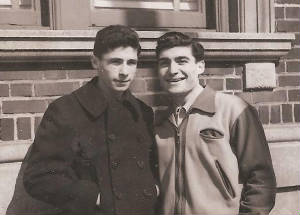
As with many forms of cancer, a family history of the disease substantially elevates your risk of developing
it. So in this case does having your neck exposed to radiation. The endocrinologist asked me repeatedly if I’d ever
had radiation therapy, an acne treatment popular in the 50s that has long since been curtailed because it proved to cause
thyroid cancer. He was heartened to hear that I had not. The thing that seemed to remain of paramount concern to him was that
one of my uncles had been diagnosed with thyroid cancer at age 40 (although this man had been completely cured and recently
turned 85).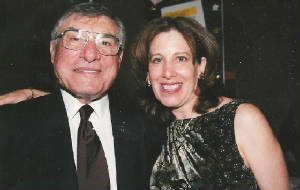
I later learned from his daughter, however, that he had undergone radiation treatment in his youth, and that
his thyroid cancer unequivocally had been attributed to that. This, to me, was adequate reason to dismiss any concerns about
my having a genetic predisposition.
I’d been so relieved to hear this, in fact, that in the ensuing
months I'd begun to formulate a proposition that I planned to pose to the thyroid surgeon when we met.
How unreasonable would it be, I
wondered, for me to delay having that full biopsy for awhile? Couldn't I undergo another ultrasound in six months to
see if there’d been any changes before taking further action? Having read how prevalent thyroid nodules were, and that
thyroid cancer tends to be extremely slow-growing, I was willing to take the risk if she was.
This was a plan that I rehearsed in my mind as I sat anxiously in the thyroid surgeons’ waiting room
last Monday. Of course, I’d wait to hear what she thought was my best course of action before saying anything .
(I am only a Web MD -- Mom/Doctor. She’s the one with the medical degree.) But I didn’t have high hopes that she’d
go along with it. I was expecting to hear the worst.
I kept trying not to stare at the elderly woman who had just arrived
in a wheelchair with a wide swath of gauze barely concealing a prominent lump protruding on her neck. Finally, after cooling
my heels for nearly an hour, I was led into the examination room. Ten minutes later, there was a faint knock. Then the door
swung open slowly.
Dr. Fritts appeared to be around 50, her shoulder-length brown hair flecked with whispers of gray. No make-up.
No nonsense. Just an earnest, soft-spoken demeanor.
She asked how the nodules had first been detected and began
to take copious notes on a lined white pad. Then she inquired about my family’s medical history. With some trepidation,
I admitted that both of my parents had died of cancer, although of very different forms of the disease. Then, at the great
risk of sabotaging my strategy, I confessed what had happened to my mother.
Soon after her older sister, my
Aunt Gloria, had died of breast cancer at age 64, my mother had undergone a mammogram. This had revealed something that
her doctor deemed highly suspicious. My mother insisted that she knew better, however. She was convinced that this was merely
scar tissue from a fibroid she’d had removed years earlier. To circumvent any further debate or the prospect of any
follow-up procedures, she then refused to get another mammogram until 16 years later. That’s when her longtime gynecologist
retired, only to be replaced by a younger woman who was assertive enough to out-argue my mother (no easy feat). By now, of
course, what had once been only a pea-sized growth had burgeoned to the size of a grapefruit.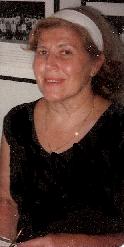
Her cancer, athough slow-growing, had also had plenty of time to spread. Surgery and a variety of onerous
treatments kept her alive for another five years. But she’d finally succumbed to it two years ago, at age 81.
I didn’t want to follow in
her footsteps, ignoring potentially serious symptoms by playing ostrich. On the other hand, neither did I want to have unnecessary
procedures. In the end, I suppose, I am truly my mother’s daughter. I feel fine, therefore I am.
Yet my reluctance wasn’t
entirely a matter of wanting to have my own way or avoid an unsightly incision that would fade with time. I take great
care to follow a healthy diet. I exercise regularly and keep my weight in check. Blood tests had indicated that my thyroid
was functioning normally. I feared that removing it would throw my system out of whack. Without it, I’d have to rely
on pills to regulate my metabolism for the rest of my life. And as impressed as I am with modern medicine, I happen
to be rapidly medication-phobic. I'd rather let my body continue to function naturally, if possible.
Yet I didn’t mention any
of this. I held my tongue -- also no easy feat -- and waited to hear what the doctor would recommend.
After I had supplied satisfying answers to all of her many follow-up questions, she asked me to sit on a
low stool facing away from her while she probed my neck, far more gently than any male doctor who had laid hands on that region
in recent times.
Then she summoned me to sit opposite her once again on a chair. She made a few more notes, then folded her
hands in her lap and looked earnestly into my eyes.
“The only way to be certain that you don’t have thyroid
cancer is to put some of your cells under a microscope,” she stated. “A fine-needle biopsy uses such a fine
needle that it's difficult to collect an adequate sampling of cells. But to simply remove the nodules isn’t
an option either. It just can't be done.”
Both of the nodules I had were located in the right lobe of my thyroid, she noted. Were I to undergo surgery,
the thing that would make the most sense would be for her to take the entire right lobe out. If she did, it was conceivable
that the remaining lobe might continue to produce enough hormones to adequately regulate my metabolism.
I braced myself to hear the time
frame in which this odious task would be done. All the while, I tried to continue meeting her gaze, stifling my urge to argue.
Or cry.
“But I don’t believe that’s warranted in this case,” she continued.
I caught my breath.
“I think we should take more
of a conservative approach,” she said. “I’d like you to have three more ultrasounds, one every six months
for the next year and a half.”
Just to be safe, it would also be prudent to have a second fine-needle biopsy a year after that first one, she added. But she
was willing to perform this herself, rather than subjecting me to the brutal, less skilled hospital technician who’d
caused me such anguish the last time.
“We really need to stay on top of this,” she asserted. But that didn't
mean constant invasive procedures for the rest of my life, as my G.P. had surmised. If there were no significant changes during
the next 18 months, then I could wait a whole year before having another ultrasound, then two years, and then maybe five.
Toward that end, she was going to consider doubling my medication in hopes that it would keep the nodules from growing. There
was even some chance, albeit a small one, that this might cause them to shrink.
By the same token, if any of those
tests showed that the nodules were growing substantially, then she reserved the right to throw her wait-and-see plan out the
window. Without hesitation, I agreed. But she remained hopeful that this wouldn’t be necessary.
Very hopeful.
“I don’t think you have cancer,” she said.
I’d gone to the doctor’s office all alone, hoping I’d be composed enough afterwards to drive myself home.
I hadn’t anticipated that I might end up leaving in such a state of euphoria that I could barely walk a straight
line. That’s how drunk with joy I was.
OK, maybe it’s premature to break out the Champagne just yet.
As she noted, there are no guarantees. There’s also no telling what the next six, 12, or 18 months might bring.
But I know what the next six months
probably won’t bring: a scar to cover up. Or disheartening news to break to my family, my friends and, yes, you, my
faithful readers.
If only there were a way to turn back time, I wish now that for once I had listened to my husband. I could
have noodged those doctors and gotten the surgeon to fit me in without delay. For as exhilarating as it was to get
that miraculous reprieve, I’d gladly trade it in to avoid having had an entire summer of dread steadily seeping
into my soul, like a cut-up chicken marinating slowly in a thick, messy sauce in the fridge.
Which brings up an important point. If we’re going to continue to wait and see, and I’m destined
to lead that long, happy life that Doctor No. 2 predicted, then I’m going to have to put an immediate cap on that wondering,
worrying and wallowing in dread thing. Never mind how many sunny afternoons I’ve sullied since June fretting that I
might have to undergo a minor surgical procedure. Just think of all the time I’ve wasted in my entire life agonizing
in advance about potential calamities that were never going to happen.
Starting here, starting now, I’m
going to stop planning for the worst all the time and concentrate on enjoying life a little more. Maybe I’ll even dare
to hope for the best. And now that I’m out of the woods, until January, at least, I’m going to stop dwelling on
petty concerns like having to cope with an incision -- a small incision that I’m told would be concealed by
the folds in my skin. To which I say, “Are you kidding? What folds?”
I love my new doctor. I love having
the luxury of uncertainty instead of certain doom. But mostly, I love my neck.
Wednesday, August 17, 2011
A Word From the Weiss
"Why are you coming?” my daughter demanded repeatedly, which soon
gave way to a far more emphatic and definitive declaration that left little if any room for debate: “Don’t come!”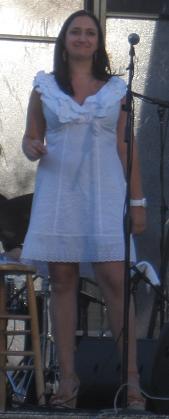
Usually, we have the self-respect or restraint to stay away when we’re not wanted.
But last week’s singing engagement seemed like something for which it was well worth driving three and a half hours
round-trip, not to mention risking our daughter’s wrath. She was going to appear with a jazz quartet directly preceding
Shakespeare on the Common -- Boston’s answer to Shakespeare in the Park, New York’s popular summer series –
a free theatrical event known to attract as many as 10,000 viewers per night.
We’ve seen her perform at countless school concerts, in cramped, dimly lit cafés off the beaten path, and once,
during a nasty storm, to an audience consisting almost entirely of a restaurant’s wait staff and us. That, after all,
is what parents do – they show up no matter what. We are the sound of four hands clapping. But aren’t we also
entitled to a dose of full-blown naches now and then, like the sound of 20,000 hands clapping?
And what greater naches
(special joy derived from children) could there be for the parents of an aspiring young singer than seeing her perform
before such an enormous crowd, even if that crowd had actually assembled to witness an entirely different event, the one directly
following?
Besides, if there were going to be 10,000 people there, then what could be the harm
in making it 10,002?
So we paid no attention to our daughter’s discouraging words. Which turned out to be a very
fortunate thing, because the day before the event, she abruptly changed her tune. One of her musicians had no way of getting
to Boston from Connecticut, where he’d just finished working at a music camp for a month. She called to ask if we could
possibly pick him up at the bus station, put him up for the night, then drive him the 100 miles to Boston in time for a rehearsal
before the concert.
Of course, we could – even if this required my husband to leave work several
hours early. (My only minor gripe was that I had to substantially rethink the dinner I’d been planning to serve because the
fellow turned out to be a vegetarian.) I also made him breakfast and lunch, and we arrived the next afternoon, right
on schedule.
Toward the end of the rehearsal, I received a frantic text message on my cell phone
from Allegra, who suddenly had realized that her parking meter was about to run out. No problem, I assured her. I had anticipated
this and had already popped in a few extra quarters. Since one of the other musicia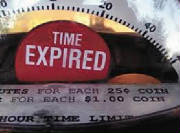 ns’ cars had broken down that day, she also now needed us to help drive the five of them and their instruments to the
concert venue and then park both cars in a distant lot while she and the band set up onstage. ns’ cars had broken down that day, she also now needed us to help drive the five of them and their instruments to the
concert venue and then park both cars in a distant lot while she and the band set up onstage.
Once
again, we were happy to help and to prove of actual use, rather than feeling like annoying creatures who’d shown up
uninvited, like bees at a cookout. But we also were left with a slightly unsettling realization. No doubt, she somehow would
have managed to do all of these things and more herself had we not been there. But how? The fact is, she needed help. Maybe
not our help. She really needed roadies. Yet we were the most able-bodied, reliable and, well, only people
available at this point. And given the state of her finances as she starts her career, you couldn’t beat the price.

Still, in retrospect, I’m left wondering if we are actually doing her any real
favors by always being so accommodating and available at the very last minute. Are we providing a bit of much-needed help
and support until she (literally) gets her act together? Is this a healthy situation, demonstrating that we’re always
there for our grown kids? Or are we perhaps doing our daughter a grave disservice, not just deterring her from finding real
roadies who might work for beer, but impeding her evolution into a self-sufficient adult?
In
other words, is this nice Jewish mom maybe a little too nice for her children’s (and her) own good?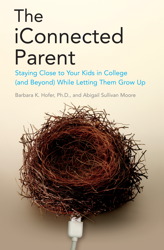
A recent insightful book on this very subject only exacerbates these misgivings. “Before
cell phones became a fact of life, college kids had to be more self-reliant,” notes The iConnected Parent, by
Barbara K. Hofer and Abigail Sullivan Moore (The Free Press, © 2010, $15). “Today, it’s a totally different
story, and our communications technology and child-centered culture are driving it. Cell phones and the Internet have changed
how parents and students communicate during the college years and beyond.”
The
book’s title refers to a new breed of parents emerging in our tech-savvy society, a group “deeply involved in
their children’s lives, even as they approach adulthood, that uses the technology of instant communication to enhance
their connection.”
How connected are they? College students the authors surveyed
tended to make contact with home an average of 13.4 times per week – a hefty hike over my own generation, whose interaction
with mom and dad usually was limited to one measly call made on Sundays.
It’s a trend that
has developed almost overnight, the authors say, or at least in the past decade. “Not so long ago kids struggled
through the transitions of those early weeks at college without talking about every detail with their parents, and if they
had problems they summarized them in the Sunday-night phone call, typically after the problems had at least somewhat resolved
or the emotional heat had faded,” notes the book, subtitled “Staying Close to Your Kids in College (and Beyond)
While Letting Them Grow Up.”
Now, instead, post-adolescents are finding it much harder to move on after they move
out. In college and beyond, they’re staying in constant touch, “using email, cell phones, iPhones, BlackBerrys,
computers, Skype and whatever new technology they can find to connect with their parents on issues large and small and to
get their help.”
This is not to suggest that these channels of communication are
by any means a one-way street, or that the younger generation can be entirely held accountable for it. “Involved parents
aren’t sure if all this instant access is healthy, but they enjoy the closeness they have with their kids and are proud
of it,” the authors observe. “And they have been so involved with their kids before college that it’s hard
to stop now, with computers and cell phones forming a continuous cord from home to campus.”
And then beyond. Evidently, once college is over, this tendency to touch base so often is often not. A follow-up study they did showed
that recent graduates were not only keeping home on the hotline, but now contacting parents even more – an average of
16.7 times a week.
It doesn’t take a calculator (or any other form of technology)
to compute that this amounts to a whole lot of communicating – more than twice a day.
So,
our kids are texting us. We’re calling them. Everyone’s emailing everyone else. Sounds like we’re all
perfectly happy and staying in the loop. What’s the problem?
Just this.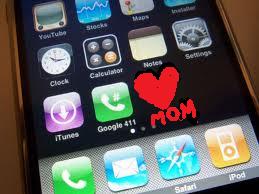
While parental aid on the road to maturity can have its benefits, the authors allow,
providing too much backup can backfire. Having an Ap for mom and dad on speed dial can slow down a crucial
stage in kids’ personal growth. “In the long run, for many young people iConnected parenting is putting their
passage to adulthood on indefinite hold,” they say.
Instead of taking initiative
themselves and grappling with their own problems, too many of these youngsters continue turning to their
parents at the slightest hint of stress, asking them to proofread their term papers, resolve roommate conflicts, or otherwise
help them cope with bumps in the road they should be learning to navigate on their own.
Yikes. As
you can probably imagine, all these issues hit pretty close to home for me. No, it’s more like they hit me right between
the i's (iPhone, iPad, and I plead the Fifth, because if I ever admitted how often I'm in contact with my kids, it would
definitely incriminate me).
Although I’ve known Ms. Sullivan, a respected Connecticut journalist, for
years, reading her words gave me a slight chill. Has she been tapping my cell phone line or hiding under my living room couch?
How does she know precisely what I’ve been up to? (She’s nice, and a mom, but unlike me, neither of her last names
is remotely Jewish. Seems doubtful she’s been reading this blog.)
As I’ve confessed
in this space from the very start, I remain hyper-involved in my children’s lives. Most of my friends know not to call
me in the morning because that’s when I keep what one of them calls “office hours.” Being a mother, my home
is my office. And I spend hours of my time there fielding phone calls… almost entirely from my now-grown kids.
In fact, to be honest, that post-grad average of 16.7 interactions wouldn’t get me through an average week with either
of my offspring. Sure, there are days when I don’t hear from one or the other of them… occasionally. But far
more typical are the times when one of them has some big issue brewing and I chat with him or her repeatedly. And the past
week has definitely been in that vein.
Granted, Allegra hasn’t phoned, emailed or text-messaged me once in the past
five days. But that’s only because she hasn’t needed to. Ever since she had four impacted wisdom teeth extracted
on Monday, I’ve been sitting right beside her on the living room sofa, except when I’m up fetching her soup, yogurt,
ice cream, Jell-O, or some other substance soft enough to be swallowed (without my having to chew it for her, that is).
Just kidding. About the chewing part, I mean. I really have been beside her on the
couch, unable to get a clear thought in my head. (That’s why I posted three days late this week.)
Clearly,
I’m not complaining about this. I love my daughter and love having her home. And even when I know I’m getting
on her nerves (i.e. almost constantly), I still relish having an excuse to spring right back into nice Jewish mothering (i.e.
smothering) mode.
Besides, having her here has kept all of my lines of communication
wide open… so I could talk to my son.
The day after Allegra’s concert in Boston, I spent well over an hour on the phone
with her older brother Aidan, followed by several more conversations that afternoon. Granted, this was far from a typical
day. I was helping him prepare for a job interview. An interview for a job in journalism, that is. My own chosen field.
Having landed a job in another profession right out of college, he’d been on
few interviews in his life and felt a little anxious about this one. I was trying to help him anticipate all the questions
that might be asked and formulate compelling answers.
The next day he called
again, of course, to fill me in after the interview, which had gone extremely well. Then he phoned once more a few hours later
to report that, alas, he hadn’t gotten the job anyway… although, as we discussed at length, this was a blessing
in disguise because it was a position he hadn’t wanted but would have been unable to refuse… and because
(as he called yet again to relate) he had just heard from someone on the staff whom he knew that he should consider himself
lucky that it had gone to someone else.
All’s well that ends well, as Shakespeare
would say. And after reading the above-mentioned book, I decided I’d be well-advised to put an end to this excessive
chatter, or at least a slight muzzle on it. But that resolution barely lasted a day.
Losing the job freed Aidan up to honor a different commitment. Weeks ago, he’d agreed to help out a former colleague
on a short film he was producing this summer. But when shooting began on Wednesday, Aidan’s direct supervisor on the
project turned out to be another former colleague, a woman who on his former job had been “the bane of my existence,”
as he put it.
“Colleen,” as I’ll call her, is one of those people who incorporate
the unappealing double-whammy of being both ridiculously incompetent and relentlessly unpleasant. Although she worked in a
completely different department from his, she often foisted demeaning grunt work upon him and treated him with barely concealed
contempt.
He’d done nothing to his knowledge to provoke this. “Some people like to
step on me because they see that I’m a nice person and I don’t like to rock the boat,” he said.
Now
that he actually was working directly under her, she was taking full advantage, demanding that he show up at 6 a.m. for no
apparent purpose and then work until 9 p.m., although he’d already made a prior work commitment for that evening. Along
with appearing egregiously disorganized, she was being openly rude and condescending to him. Did he really have to take this?
He was being paid a pittance to do this job and had been obliged to give up temporary
well-paid work on a TV show to do it. Filming was going to last seven days, including the weekend, when a close friend would
be visiting him from the West Coast. Being a person of character, he felt obliged to honor the commitment he’d made.
But given all these circumstances, weren’t there limits to that obligation?
Hmmm.
I tried to bite my tongue. I struggled to hold back. I wanted to tell him he was an adult now, so to figure it out himself
and do whatever he thought best.
But there are limits, too, for a parent who sees
her child being browbeaten, demeaned, and taken advantage of, and who knows that he may be too good a guy to fight
back… especially when she has given him too many words of advice over the years about integrity, doing the right thing,
and honoring one’s commitments. I was also worried that he might suffer through largely because he was afraid of disappointing
me.
“It’s up to you what you do,” I told him. "But if you ask me,
life’s too short to let anyone treat you like that, if you don’t have to."
Then I tried to help him sort out the situation and all of the possible options. We talked about whether the colleague producing
the film was a real friend, someone he’d ever seen outside of work or who might ever reciprocate on the favor (no);
whether he was someone likely to help Aidan in his career someday (not really), and if bailing on the job might come back
to bite him in the tush (unlikely, although you should note that “tush” was my word; the one that he
used rhymes with “crass”).
Then I added what I think may have been the
kicker: “Do whatever you want to do, but if you decide to stay, don’t call me every day for the next week to complain
about it. Because I’m not going to listen.”
That’s when he declared
that he needed to leave for his own sanity, but that he was determined to be a mensch about it. He was going to find
someone good to replace him. He’d finish that awful, 15-hour day, and then quit with a profuse apology, explaining that
he’d been offered highly paid work on a show (which was true) and he needed the money badly (which wasn’t). He
felt he had nothing to gain from confronting Colleen directly or bad-mouthing her to others.
As
he said himself, he’s a nice guy and he doesn’t like to rock the boat.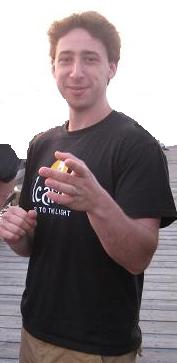
As resolute as this may sound, he still remained conflicted, yet followed though. Hours
later, he texted me to ask, “Did I mess up here?” But when he called the next afternoon, he sounded ecstatic and
beyond relieved. Colleen had accepted his resignation civilly, and he’d spent the next day working in much more gratifying
conditions at a popular new TV show, where he was well paid and, far more important, treated professionally and with
respect.
“I did the right thing,” he concluded, elatedly. “I don’t feel
like a jerk for quitting. They were the jerks. You can’t get away with treating someone like that if they’re working
for free. You can barely get away with it if you’re paying top dollar.”
I
agree. And although I’d like to think that the role I played this time was mostly as a sounding board, rather than that
of a controlling parent, I must admit that I’m glad I spoke up, and he's happy with the guidance I gave him.
“You were right,” he added. “Life’s too short to suffer fools
and put up with bulls--t when you don’t have to.”
Had he chosen to tough it out instead, would
it have been the end of the world? Maybe not, just a week of unnecessary, abject misery. Left to his own devices, might he
have made the same decision? There’s really no way to know.
What I do know is that
the authors of that book are absolutely right. I know that iConnected parents exist because I could be the poster child (make
that poster mom) for them. I talk to my kids much too much and am way too involved in their lives. Also, as the book
states, I’m proud that I’m tight with both my kids, so tight that when they aren’t within earshot, they
call or they write (or email, G-chat, text-message or if need be Skype).
Whenever
I complain to my friends that I’m unavailable for social activities because one of my kids needs me, they must realize
that it’s just an underhanded way of bragging. What I'm really saying is, "Look: I’m not neglected, forgotten,
or over the hill. Not obsolete or useless just yet. My kids -- the most important people on earth to me -- still want and
need me! A whole lot!"
Then again, if I pause to think about it, the thing
that I’m really most proud of is when they don’t.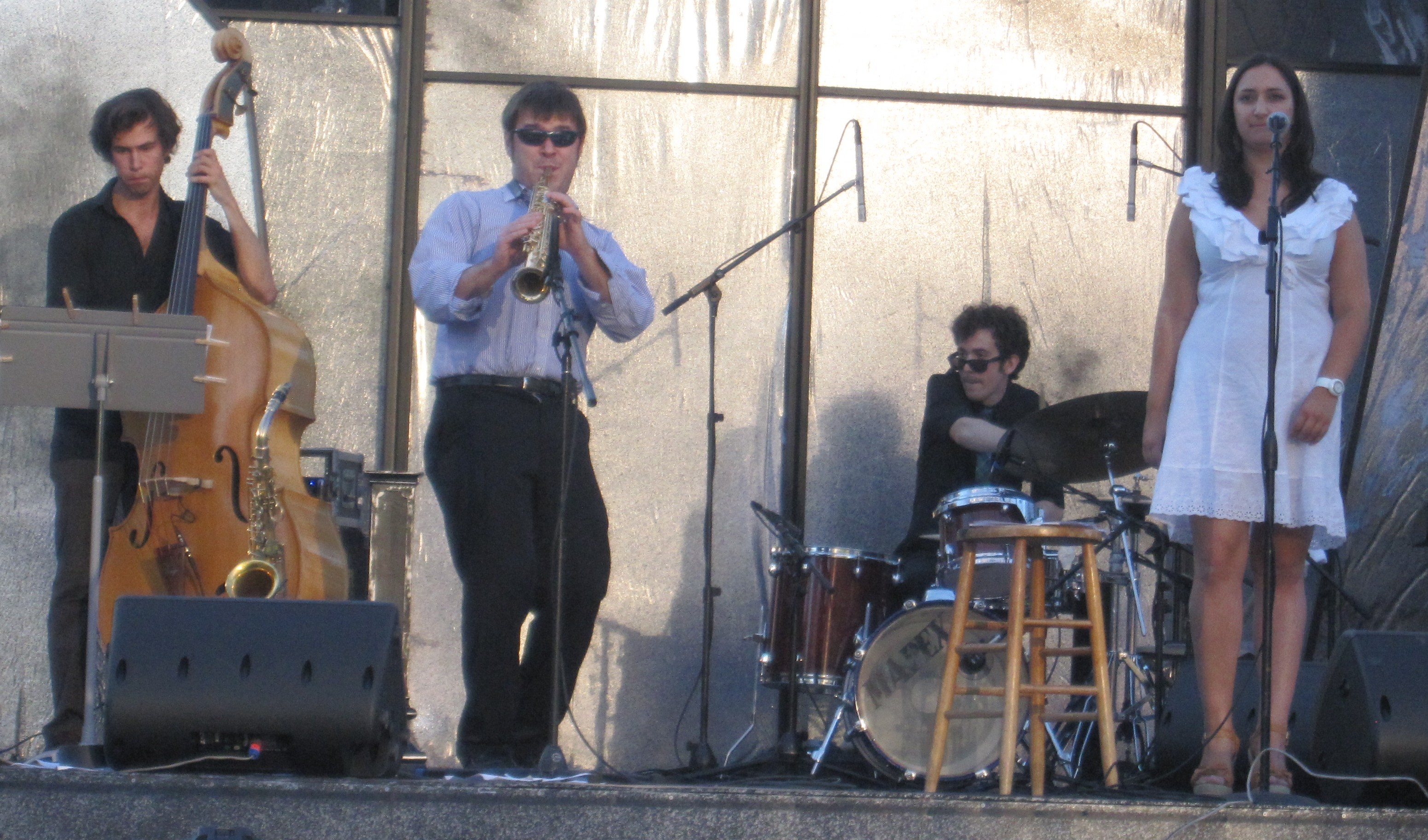
My daughter, last week notwithstanding, is very capable and largely independent. On her own, she landed that singing gig,
hand-picked four band members, selected the songs they’d perform, scheduled a rehearsal, borrowed instruments for the
musicians who were coming from out-of-town, and handled all sorts of other complex yet necessary arrangements. Not to mention
that she wrote much of the music that they performed. So what if she called us for some last-minute aid? She has the motivation,
talent and drive to succeed on her own. At 21, she already doesn’t need that much help.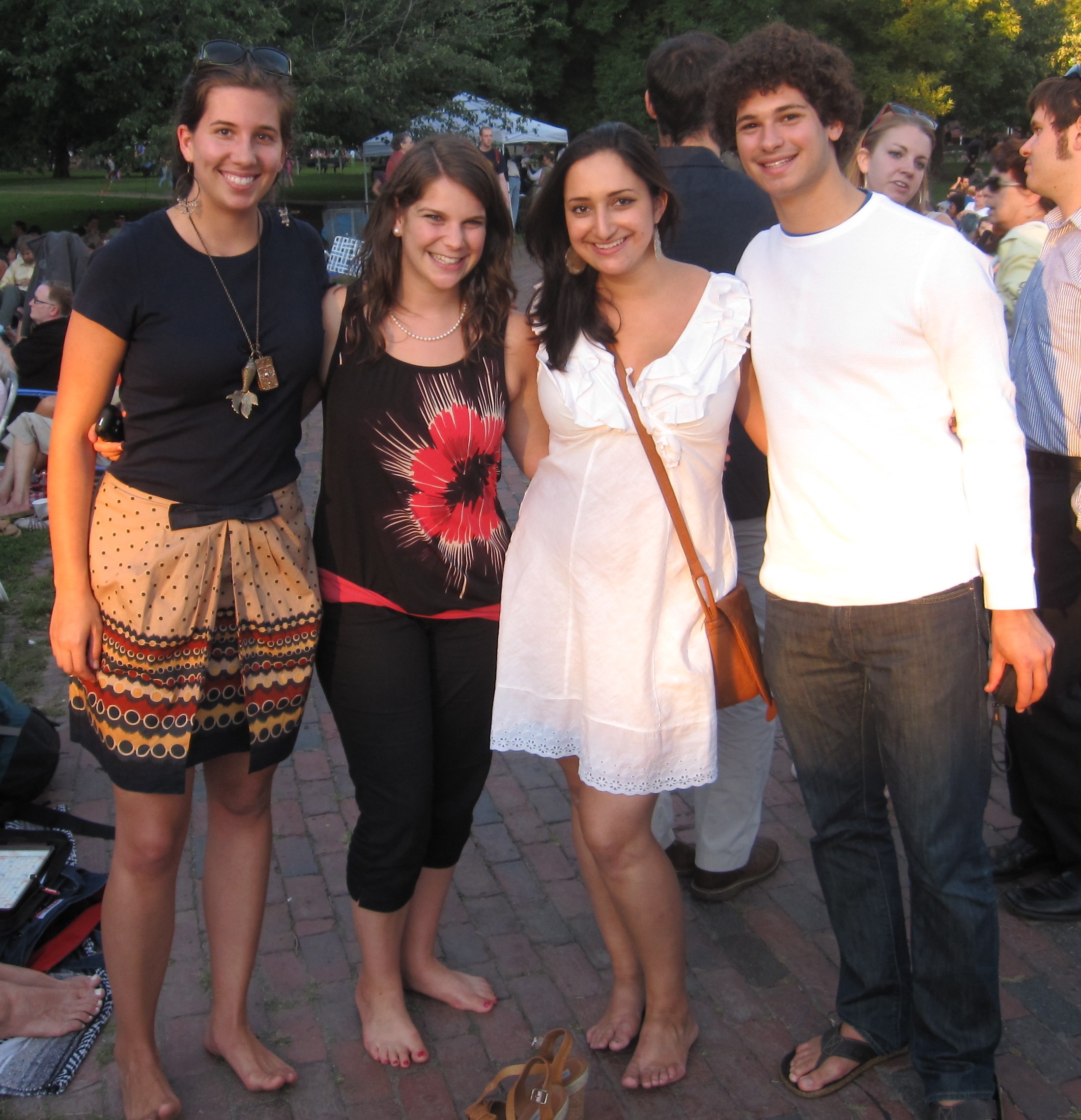
Then again, not all of that interaction between us is about getting advice and help.
After her performance -- which was wonderful, and did draw an enormous crowd, although not quite 10,000 -- we ended up staying
for much of the Shakespeare show itself. Eager to give her space and let her sit with some of her old high school friends,
who had surprised her by showing up, we sat far across the park from her. (I ended up behind another young woman whose little
white dog, named Luna, seemed far more entertained watching me eat a turkey sandwich than by any of the action unfolding
onstage.)
Yet soon after the play began, Allegra began text-messaging me repeatedly. She was worried about finding her car, which I
had parked and she would need to locate herself later. She was curious when we were leaving to drive home and wanted to make
sure she said goodbye. But mostly she just wanted to talk and joke about the play, which was, indeed, All’s Well
That Ends Well.
“Is this entirely about sex?” she inquired at one point, noticing the comically bawdy gestures several
actors were making to underscore the Bard’s many double entendres.
“Yes,” I wrote back. “Entirely.”
Similarly, is all this communicating about being afraid or unable to cut the proverbial cord?
Not
entirely.
I wish that I had the self-restraint to not pick up the phone now and then when
my children call (or text), or to ask them “Why are you calling?” followed by a far more emphatic and definitive
declaration that leaves little room for debate: “Don’t call!”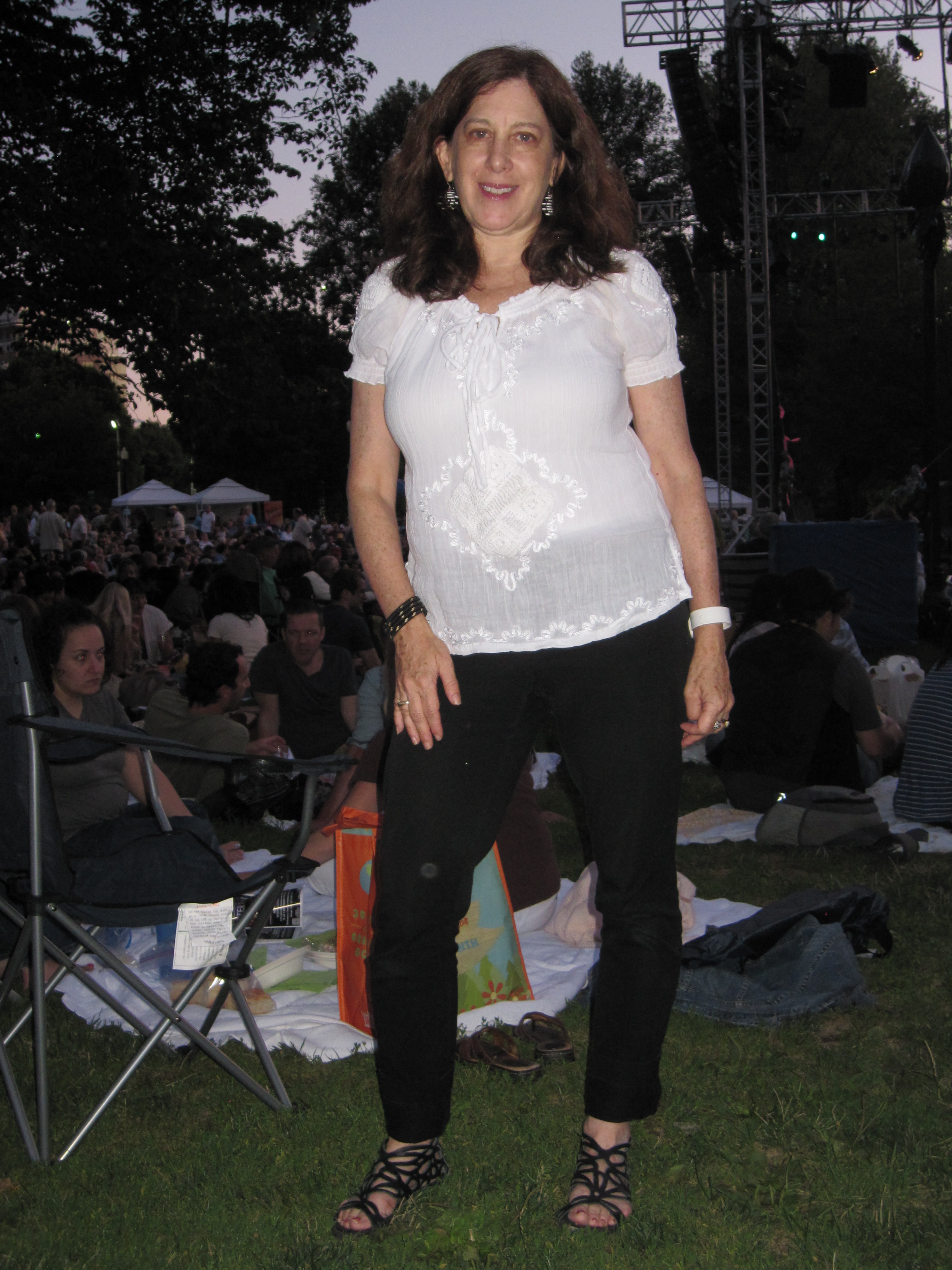
I can only hope that as time goes on, the calls will be less and less about asking
“What should I do?” and more about simply wanting to report, “Hey, guess what happened!”
For
now, I’m just going to try to hold back more and maybe cut calls a little shorter. To let my kids sort things out for
themselves, even if that means they end up bumbling, stumbling, suffering fools, or sometimes falling on their tushes
(or any other preferably padded body part).
But whether I hang up or light
up when their numbers appear on my caller ID… whether I hold back or let loose with emails spewing advice and encouragement…
whether I text that I’m rushing to the rescue or reply that they need to put enough damn quarters in the meter themselves,
or pay the parking tickets if they don’t… is it all about love?
Entirely.
To hear Allegra singing at Shakespeare on the Common, click on
this YouTube link:
http://www.youtube.com/watch?v=beuozyc0P3c
10:38 pm
Wednesday, August 10, 2011
A Word From the Weiss
 We’ve got the debt ceiling near-debacle, the S&P credit rating downgrade,
and Wall Street on a hair-raising rollercoaster ride, and yet I still heard the president referred to on the news the other
day as “No Drama Obama.” We’ve got the debt ceiling near-debacle, the S&P credit rating downgrade,
and Wall Street on a hair-raising rollercoaster ride, and yet I still heard the president referred to on the news the other
day as “No Drama Obama.”
No drama? Oh, mama! I’m not saying I don’t love the president. (I do, I do!) Nor that I expect life to
be as wrinkle- free as Joan Rivers’ face after Botox. (I don't!) I just wonder why this nice Jewish mama has so much
drama, and what I need to do to get through it.
Get elected president? Get
a lobotomy?
Or just grin and bear it... or, better yet, bare it in my blog?Just consider all the drama that has passed for everyday
life in the past week alone for this Nice Jewish Mom.
It all started last weekend, after we returned from the Jewish fundraiser that my daughter sang at in Vermont. Allegra
planned to return to New York early the next day. And so she would have, had it not been for the terrible toothache she’d
been nursing for the past month. Along with being in abject pain, she didn’t want to risk any complications. If you
aspire to make your living as a singer, as she does, you can’t afford to mess around with your mouth.
Allegra needed to get that tooth extracted pronto, along with her other wisdom teeth. My husband managed
to get her a last-minute appointment with his dentist, who then booked her with the oral surgeons downstairs for early the
next morning. We arrived before 8 a.m., only to be kept waiting for over an hour and then told after a lengthy examination
that they were out-of-network for her insurance and the procedure would cost us thousands.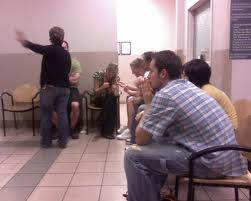
So we went home, found another surgeon who actually was on her insurance plan, and had to repeat the entire process,
including another hour spent in a waiting room. (Which is why, I guess, they call these places “waiting rooms”…
although I don’t know for the life of me why the people who are waiting to see doctors are called “patients.”
Because by the time we finally got in to see this fellow, Allegra was anything but.)
 Her boyfriend Stevo accompanied us on round two, and while we were waiting he received a phone call. A close friend
had learned of a job opening and convinced the man who was hiring that Stevo was the perfect candidate for the job. This opportunity
was, unfortunately, located in Los Angeles, and he needed to fly out for an interview asap. And suddenly, the trauma of Allegra’s
raging toothache paled in comparison to her potential heartbreak. I implored her not to go into full-fledged emotional throttle
until he’d flown to California, had the interview, and actually landed the job. This, of course, was about as useful
as telling the Colorado River to stop rushing over the Hoover dam. Her boyfriend Stevo accompanied us on round two, and while we were waiting he received a phone call. A close friend
had learned of a job opening and convinced the man who was hiring that Stevo was the perfect candidate for the job. This opportunity
was, unfortunately, located in Los Angeles, and he needed to fly out for an interview asap. And suddenly, the trauma of Allegra’s
raging toothache paled in comparison to her potential heartbreak. I implored her not to go into full-fledged emotional throttle
until he’d flown to California, had the interview, and actually landed the job. This, of course, was about as useful
as telling the Colorado River to stop rushing over the Hoover dam.
 Moments after putting them on a
train bound for New York, I received a phone call from my son. Aidan had just gotten a job opportunity himself about which
he was extremely conflicted. Although he’s been working in the TV and film industry for a few years, he also writes
about music on a freelance basis. His editor at one of the publications for which he writes had quit to work elsewhere and
had recommended him to replace her. As gratifying as this might seem, he had a major decision to make. DId he really want
to do something as lame and non-lucrative as following in both his parents’ footsteps by becoming a journalist? Would
this job mean giving up his celluloid dreams? At the very least, getting hired would require foregoing the graduate school
program he was scheduled to begin next month. Moments after putting them on a
train bound for New York, I received a phone call from my son. Aidan had just gotten a job opportunity himself about which
he was extremely conflicted. Although he’s been working in the TV and film industry for a few years, he also writes
about music on a freelance basis. His editor at one of the publications for which he writes had quit to work elsewhere and
had recommended him to replace her. As gratifying as this might seem, he had a major decision to make. DId he really want
to do something as lame and non-lucrative as following in both his parents’ footsteps by becoming a journalist? Would
this job mean giving up his celluloid dreams? At the very least, getting hired would require foregoing the graduate school
program he was scheduled to begin next month.
I suggested that he not go into the full-fledged agony of deliberation
until he had actually been interviewed and offered the job. But this was like telling Hamlet to chill out.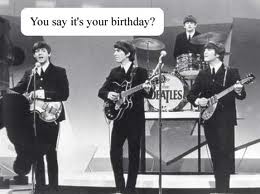
That night, I remembered that it was an old friend’s birthday, so we gave him a call. Only after we’d
finished singing a rousing “Happy Birthday” in two-part harmony did he note to us that his birthday was, in fact,
a whole week away. Awkward! We told him we had simply called to practice singing for him. Then we offered to go out with him
on Saturday night to celebrate.
His wife called me a few days later to plan our night out. These
people are not just great people and great friends; they’re also regular readers of this blog. So far be it from me
to cast any aspersions. Let’s just say that when four people get together, it’s always hard to find a movie and
a restaurant that will appeal to everyone. But in this case, it was more like trying to figure out how to establish peace
in the Middle East.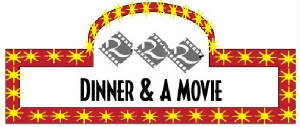
The biggest problem of all was the schedule. As night owls who rarely hit the sack before 1 a.m., we like to eat dinner
at around 7 or 8, then catch a late movie afterwards. They wanted to see the 4:20 matinee, then eat at around 6.
I knew there was no way my husband was going to agree to go inside a darkened movie theater in the middle of the afternoon
on a nice summer day. That would be like telling Jay Leno to let Conan have The Tonight Show and go on the air at
4 in place of Oprah. But after strategizing enough to have planned a war, the latest start time we could agree upon was to
meet for dinner at 5:30, followed by a movie at 7:45.
My husband had the exact reaction I had anticipated when he got
home. So it didn’t help when I received a call on Friday night from some other old friends. These people had moved away
years ago, and we hadn’t seen them in ages. They were in town and wanted to come over for a visit late Saturday afternoon.
These are great people and great friends, and I was genuinely eager to see them. However, I knew that my
husband, as thrilled as he’d be to see them too, would not be thrilled to know that we now had to leave our swim club
early in the afternoon so we could sit inside at home. Unfortunately, I also informed him when he wanted to go to the club
at noon the next day that we needed to clean up for our company first, as well as prepare some hors d’oeuvres. By the
time we got there, it was almost time to go home.
We managed to fit in a bit of tennis, followed by a quick swim. Then I dashed into the locker room to change. Unfortunately,
just as I was about to go into the shower, I thought I spied another woman I haven’t seen in a long time entering the
restroom.
This is a lovely woman, a very nice Jewish woman, one who used to be a friend. But we’d lost contact over the
years, and I knew that if she saw me we’d end up chatting for at least 10 minutes, and those were 10 minutes I didn’t
have. So the second I saw her disappear into a stall, I dashed across the room and into the shower, not bothering to take
off my bathing suit first or to turn on the water so I could adjust the temperature.
 Only then did I turn on the water, which was absolutely scalding. I rotated
the dial in what I thought was the right direction, hoping to cool it off. Instead, it only grew hotter. Steam was filling
the shower stall, and I felt like I was about to get boiled like a chicken. Or maybe steamed like a dumpling. But which was
worse, getting my goose a little cooked, or jumping out, colliding with this woman, and getting home 10 minutes after our
guests? Only then did I turn on the water, which was absolutely scalding. I rotated
the dial in what I thought was the right direction, hoping to cool it off. Instead, it only grew hotter. Steam was filling
the shower stall, and I felt like I was about to get boiled like a chicken. Or maybe steamed like a dumpling. But which was
worse, getting my goose a little cooked, or jumping out, colliding with this woman, and getting home 10 minutes after our
guests?
I envisioned myself as a female version of Larry David on Curb Your Enthusiasm, diving out and landing soaking
wet at the feet of the one person I was ineptly trying to avoid. Instead, I gritted my teeth, turned the dial way in the opposite
direction, and shuddered as the water went directly from burning hot to bitterly cold without passing warm. Ayyyyee!
Once I’d turned it off after a quick rinse, I realized that my troubles weren't over. What if she’d taken
a long time in the restroom, as people sometimes do, and she now walked out just at the same time I did? How could I tell
if the coast was clear? I stood in the shower with the door cracked open half an inch, peering out for at least five
minutes as people wandered in and out. By now, I realized that it probably would have taken less time to have just talked
to her in the first place. But if I saw her now it would take another 10 minutes. So I waited some more, without seeing her
pass. Finally I wrapped myself in my towel and made a mad dash for the nearest curtained cubby to dress.
I still wonder if it was really
her at all, and, if so, if she'd seen me. Is it purely a coincidence that the next day, out of the blue, she tried to “friend”
me on Facebook?
When I emerged from the locker room fully dressed for our night out, I realized that my husband was nowhere
to be found. I hoped he was in the men’s room getting ready, too. But five minutes later, he emerged from the snack
bar still in his bathing suit. And I realized that while I’d been showering, dressing and, yes, hiding out, he had taken
advantage of having the coast clear himself by grabbing a hot dog, something that I rarely if ever let him have at home.
Face it, there’s nothing better than a kosher hot dog, at least as far as my husband is concerned. As far as I’m
concerned, there’s nothing unhealthier. All that fat! All that sodium! That’s why I rarely serve them at home,
and why, I now realized, my husband had been so eager to go to the club. It wasn’t for the tennis. It wasn’t for
the exercise or relaxation. It was all about the hot dog that he’d sneak while I was dressing afterwards.
“Now we’re going to be late!” I barked at him (speaking of dogs). Now I was Susie Essman’s
character on Curb, cursing out her long-suffering and always hungry hubby. “And you haven’t
even showered yet. Did you actually eat a hot dog while I was getting dressed?”
“What makes you think that?”
he asked, his voice rising at least an octave as he wiped a small trace of mustard from his lips. “I went to the bathroom,
and when I came out I didn’t know where you were, so I just went in and had… you know… a side salad.”
 The reason they call it a “side
salad” is that it comes on the side of something else. And given options like potato salad and fries, I’m sure
he was lying about the salad, too. But I was more upset that now he’d have to shower and dress after our guests left. The reason they call it a “side
salad” is that it comes on the side of something else. And given options like potato salad and fries, I’m sure
he was lying about the salad, too. But I was more upset that now he’d have to shower and dress after our guests left.
Face it. It’s always a mistake scheduling social engagements back-to-back, especially for us. We’re invariably
late for everything, and when there’s more than one activity involved, we’re destined to get a domino effect.
But this time we’d had no choice.
By the time we pulled into our driveway, we saw the people we were expecting, Julie and Stan, walking
up to our front door. My husband’s first impulse was to try pulling into the garage quietly, hoping to avoid detection,
then go answer the front door as though we’d been home all along. Face it, it looked a little tacky that he'd been so
eager to fit in tennis and a quick dip (or dog) that we’d risked being late to see them after all these years. But just
as we pulled up to the house, they turned around and saw us. So we had to settle for looking tacky. They declined to eat any
hors d’oeuvres, after all. But I think my putting some out made them feel welcome. At least the house was clean.
I’d warned them in advance that we had to leave for our dinner out by 5. But we had an awful lot of catching
up to do after all those years, and once they’d left, my husband still had to shower and dress, so the dominoes began
to fall. Of course we showed up for dinner 15 minutes late. But – other than the husbands changing
our carefully laid plans at the last minute by choosing to see the latest “Planet of the Apes” installment
while we women still opted for our chick flick of choice, Crazy Stupid Love -- there wasn’t too much more drama
until the next day.
My
financial advisor had emailed on Friday to remind me that he’d sent me some documents that needed to be signed by both
my children and mailed back right away. Both my kids live in New York now, though, and I rarely see my son. So I emailed back
explaining this and asked if, with their permission, I could simply sign their signatures for them.
“You think I can or should
respond to that one directly?” he wrote back. “How about sending me an email in an hour telling me you just remembered
that both kids told you they are coming in for church and dinner on Sunday?”
This was more of a joke than you
might realize. My advisor is not just my advisor. He’s one of our best friends. He’s also not up for church on
Sunday, or any other day. We met when our kids were in Jewish Day School together. He’s a member of the Tribe.
A little abashed, I thought about what he’d said. Then I suddenly remembered that we actually were
seeing our daughter on Sunday. We planned to meet her at the Litchfield Jazz Festival in Kent, Connecticut, an annual event
that we always attend because it’s always pleasant and she used to work there. I emailed my son telling him his sister
was joining us there and asked if he would come too.
“Sure,” he wrote right back, to
my delight and slight surprise. Wow. That was easy.
So after about an hour, I wrote back to my advisor, Jake, informing
him of this.
He was extremely pleased. “Great note you sent!” he added.
"Thanks!" I wrote back. "But the really great part is that it's the TRUTH!"
"Really??"he replied
on his Blackberry.
“Yes!” I assured him.
“Deus ex machina,” he wrote, a Latin phrase (which
translates as “G-d out of the machine”), referring to a plot device in which a seemingly hopeless dilemma
is suddenly resolved with the unexpected intervention of some new character, contrived situation or unexpected event.
"Exactly," I agreed.
Then he reverted to a far more familiar language. “Well, mah nish-ta-na!” he wrote.
“Ha-lai-la ha-zeh!” I responded, adding, “I kid you not.” And realizing that
he clearly remained skeptical, I promised to send a photo of all four of us in front of the bandstand.
 The kids were planning to take an early train to the nearest station, located in a remote town called Amenia, New York,
which wasn’t really all that near. But Allegra assured me that there’d be a shuttle bus waiting to transport them
to the festival. My husband and I would make the roughly 90-minute drive to Kent and meet them at noon. Yet the night before,
there were already complications. Allegra would be proceeding from Kent to Boston, where she’s performing this
week, then returning home to have those pesky wisdom teeth extracted. But she hadn’t packed yet, it was already midnight,
and she was much too tired to do it now. So they decided to take a later train and arrive at 2 instead. The kids were planning to take an early train to the nearest station, located in a remote town called Amenia, New York,
which wasn’t really all that near. But Allegra assured me that there’d be a shuttle bus waiting to transport them
to the festival. My husband and I would make the roughly 90-minute drive to Kent and meet them at noon. Yet the night before,
there were already complications. Allegra would be proceeding from Kent to Boston, where she’s performing this
week, then returning home to have those pesky wisdom teeth extracted. But she hadn’t packed yet, it was already midnight,
and she was much too tired to do it now. So they decided to take a later train and arrive at 2 instead.
Morning rain cleared up to be replaced by one of the most oppressively humid days ever. We arrived in time
to hear the first act, a sensational jazz pianist/singer, Dena DeRose, but soon began to worry that Allegra was wrong about
there being a shuttle bus. We started asking people who worked there. Most of the workers were volunteers, though, and
had no clue. Finally, we got the definitive word: No shuttle. There'd only been one to meet the first train that morning.
Now I’d have to take a shuttle bus myself back to the distant off-site lot in which we’d parked, then
go pick them up.
The problem was that no one knew where the train station was, either. By now, the kids’ arrival was
imminent. So, as crazy as it may seem, I just started driving in the right direction, assuming that I’d call Allegra
en route and she’d get directions on her iPhone. (No, I don't have one myself, nor, I must confess, a GPS.)
Allegra located directions quickly. Unfortunately, she told me to turn right when I was supposed to turn left. Or maybe
it was left when I was supposed to turn right. Soon after, being in the middle of the boonies, I lost cell phone service completely.
So I drove for miles in one direction, then turned and drove in the other. At last I saw a country church in front
of which two ladies were standing around chatting. (So I guess I was the one who ended up going to church on Sunday,
after all.) These people gave me directions, and within 40 minutes of my initial departure, I was there.
My relief, however, was short-lived.
After a lovely day of music and a nice
meal out, I returned Aidan to that distant station that night, this time wending my way without travail. Then the rest of
us set off for home, along with Stevo and Allegra's friend Aubrey, who had joined us for the day. As we drove, though,
I discovered two unfortunate things. One was that the afternoon's extreme humidity had given way to a dense
fog that condensed so quickly on my windshield I could barely see five feet ahead of me.
The
other was that between using the a/c and all my driving to and from that train station, I had used up a lot of gas. An awful
lot. I'd started out that morning with enough to get there and back, but now I’d have to fill up soon.
I felt confident we’d make it to the next service station. But after a little while, a strange thing
happened. The digital gauge on my dashboard, which displays exactly how many miles the contents of my tank will take me, indicated
that I had 11 to go. Only seconds later, that 11 turned into a 10. Then 9. Then 8, 7, 6…
Within a minute, it showed a big round number, and not a very nice one.
0.
There were five of us in the car. We were in the middle of nowhere. It was late, dark, and foggy. And no one had the
foggiest idea where the next gas station might be.
Oh, one more thing. Being deep in the boonies,
we had no cell service once again.
So I did the only thing any nice Jewish mom could do in this hopeless
situation.
Not pray. Nor cry.
Coast.
I turned off the a/c and the defroster, opened the windows wide,
then took my foot off the gas pedal and let the car fly.
And we were flying. I soon discovered something I hadn’t
noticed on the way up. This was that the way up had indeed been entirely up. And now we were going down.
Down, down, and then down some more. The hard part was not stepping on the brake at all whenever we really picked up
speed. And sometimes we picked up lots of it. A little too much for my liking. But I couldn’t risk braking and running
out of momentum.
According to my daughter, who’d often driven this route while working at the festival, the nearest gas was
in a town called Torrington. This was at least 7 miles away, or maybe more. And we’d now been on
empty for awhile.
Then again, we were still coasting.
And still headed down, down, down.
After awhile, at last, we saw some lights around the bend in the distance.
They turned out
to be from a skanky-looking, middle-of-nowhere, boonies-type bar. I guess we could’ve gone in there to ask for help,
but I was still afraid to stop.
The roads, all steep and surrounded by dense forest, were almost empty of
traffic.
To lighten the mood, my husband began singing. “Ninety-nine bottles of beer on the wall, 99 bottles
of beer…” To lighten the load, I thought of pushing him out the door. Without stopping, of course.
We’d been headed downhill
for so long that the road would have to level out soon. It’s not like we’d started at the top of Mt. Everest.
But I hadn’t touched the gas for miles, and we were still angled precipitously forward.
At last,
we saw dim lights again just around a bend in the distance. A pizza place? Another watering hole? A church?
No. A convenience store. Next to a Shell station. The shop looked like it had just closed up for the night. But the gas pumps
still took credit cards. We were in Torrington. Strip mall heaven. Back to civilization. Well, maybe not civilization, exactly.
But we were saved!
Allegra, relieved but irate, reminded me of the countless other road trips on which I’ve cut it way
too close on the gas supply, then accused me of doing it deliberately because I enjoy the adrenaline rush. (I don’t!
I don’t! I’m just often too busy to fill up first.)
And so as not to ruin this happy ending, I will not
even begin to tell you about the next night, when we discovered that my husband had lost his hearing aid and we turned the
house upside down for hours and finally drove back to his office at 11 p.m. to search every inch of every room he’d
been in that day, along with the parking lot by flashlight.
Or how we were still looking for it when my daughter phoned us from Boston a little before 1 a.m. that night, sobbing
and screaming so hysterically that it took a while to understand what had happened -- that she was fine herself, but was in
shock because she had just driven by a fresh car accident and seen two dead bodies lying face down in the road.
This was not at all funny. But it was the truth.
So, tell me. Hasn’t this mama had more than enough drama for only one week?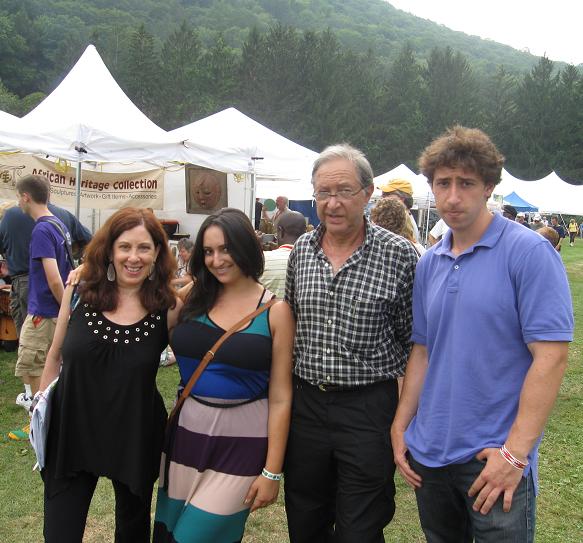
And what if all these perils continue to come my way or even pick up the pace? Can I just keep coasting?
Can any one of us afford to simply coast through life? What about all of the inevitable uphill climbs, occasional detours
and roadblocks? Sure, I found a station in the nick of time this time, but, as we all know, life is never downhill all the
way.
At least my husband’s missing hearing aid finally showed up at work the next day. (A coworker found
it and turned it in.) My car still has a full tank of gas (and it’s going to stay that way). And I managed to get my
kids’ signatures on all those documents and send them, along with a photograph proving their authenticity, to my advisor
friend Jake.
Mah nish-ta-na ha-lai-la ha-zeh… mi-kol ha-lei-lot. Really!
3:35 pm
Wednesday, August 3, 2011
A
Word From the Weiss
There’s something nice about knowing people who own second homes and who invite you, year after year, for wonderful
weekends away, especially during the summer.
But there’s also something not that nice about it, and that’s realizing that you only have one residence
yourself, and if you accept, you will never be able to reciprocate in any remotely equivalent way. You can do your best to
“give good guest” – to bring pleasing house gifts, help out at mealtime, and try to be amusing and agreeable
company – yet face it. Everyone knows the shoe is never going to be on the other foot because there’s only one
shoe.
Or is it only one foot?
This can particularly be an issue when there are people who invite you not only year
after year, but more than once a year, either because they are relatives and feel obligated or guilty, or because somehow
one of these visits naturally leads to another.
Such was the case this past weekend when we were invited to revisit the palatial second home our friends
Pat and Michael have built for themselves in Stowe, Vermont.
It all started earlier this year. Day One, to
be exact. When they heard that our daughter Allegra was going to be singing with her boyfriend’s rock band at a ski
lodge in Stowe on New Year’s Eve, Pat and Mike invited us to spend that whole weekend at their place. Allegra roomed
elsewhere with the band, but joined us for Pat and Mike’s New Year’s Day brunch, where, given her outgoing nature,
she charmed many another guest. One woman there was helping to plan a fundraiser for the local Jewish community center and,
upon learning that Allegra was an up-and-coming jazz singer, asked her to perform there. (Yes, they have Jews in Vermont,
and Pat and Mike seem to know all of them.)
More often than not, invitations like this don’t amount to
a hill of beans in this world. But this woman and Allegra stayed in touch, and eventually a date for the gala was set. That
date was July 30, and Pat and Mike graciously invited us to attend the event with them and once again stay at their home.
We, of course, readily accepted.
We wanted to drive Allegra the four hours up from Connecticut to Stowe, anyway. We were eager to visit our
friends there. Also, although we try to attend most of our daughter's performances, we were particularly excited
about this one. As a recent college graduate, Allegra accepts almost any gig she gets. And do I mean any. Some offers she
fields are sublime – next Thursday night, August 11, she’ll be the opening act for Shakespeare in the Park on
the Boston Common, an annual event commonly attended by thousands. But others are a little ridiculous. Last month, she was
hired to serenade a pair of newlyweds on their first anniversary while they ate dinner on their driveway. And twice this summer,
she’s singing with a jazz quartet in a tent outside some shopping outlet stores in Massachusetts. (Music to bargain-hunt
by? Good thing her repertoire doesn't happen to include “Hey, Big Spender!”)
Last weekend’s event might
not have drawn thousands – there may be Jews in Vermont, but there aren’t that many – yet it was
more the former than the latter. At a restaurant in our town where she plays monthly, she’s expected to provide background
music sedate and soft enough to not upstage dinner conversation… or even chewing. Here, though, she would be taking
the stage in a short, shiny, red satin dress, headlining as the evening’s entertainment.
Well, make that half the
evening’s entertainment.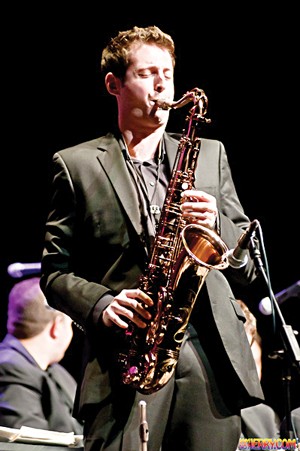
When Allegra began chatting with Pat’s friend Suzan on New Year’s Day, Suzan seemed eager to
book her immediately. But her husband Gary wanted to hire a young saxophonist he’d heard instead. Evidently, they hit
upon a compromise. They hired both the sax player’s band and Allegra, and requested that they perform at the gala together.
This may sound perfectly reasonable, but it’s not exactly how it’s normally done. Allegra’s repertoire
includes many songs that she’s written herself, as well as her own original arrangements of assorted jazz standards.
She also maintains a sizable stable of instrumentalists who know her material. She normally performs with them.
The saxophone player, meanwhile,
also writes a great deal of his own music and has his own backup musicians. They didn’t know Allegra’s songs.
She didn’t know his. So, whose songs and arrangements were they going to perform?
Gary and Suzan made it clear that
they wanted the group to appear as though they were a polished act that had been performing together for years. This
was a fine concept, but not necessarily a realistic one, considering that they’d never played together. Why, they had
never even met! In the interests of pleasing both their employers and the audience, Allegra and the sax player, a New York-based
fellow named Brandon Wright, planned a rehearsal for two days before the gala. But Allegra admitted to me that Brandon had
allotted only about 90 minutes together to prepare for a two-hour show. How polished would their act possibly be?
Adding to my trepidation was my impression of the audience, a sense only reinforced by remarks I began hearing
from Pat. The dinner for 125 had sold out rapidly, and the concert was nearing its capacity of 180 as well, aided perhaps
by a fetching photo of Allegra that had been published in the local paper. The people planning to attend, however, were an
older crowd and not necessarily one comprised of people sophisticated about music. Most were coming, I gathered, not because
they loved jazz, but because they loved Jews. Or maybe they just wanted to see and be seen at one of Stowe’s biggest
social events of the year.
Then there were the people who didn’t really want to come at all. Pat actually
had been enlisted by one of her friends’ husbands to persuade his wife to attend against her will.
No shrinking violet, Pat hadn’t needed any arm-twisting to promptly make the call. “Why aren’t
you going to the fundraiser?” she’d demanded of this intransigent woman.
“Why should I go?”
the woman had replied flatly. “I don’t like jazz.”
“Well, do you like me?”
Pat had spunkily responded. “I’m going to be there. So… come!”
The upside to this apparent apathy
was that this would not be a highly critical audience, able to discern if the band was under-rehearsed or the slightest
element were subtly off.
The downside? They were unlikely to appreciate the original tunes or other relatively
challenging music that both Allegra and Brandon Wright, I gather, prefer to play. Face it. People claim to want new experiences
and to crave originality, but we tend to enjoy music much more when we’ve heard it many times before. And in order to
guarantee that this audience was already familiar with everything that was played, Allegra and Brandon were going to have
to reach into the Great American Songbook, and not reach terribly deep.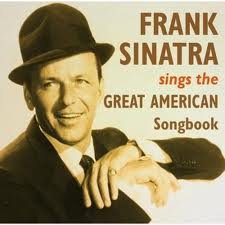
“You know the wonderful song that I always request, the one by Antonio Carlos Jobim?” I asked
Allegra a few days before the performance. “Well, I have another request: Don’t play it this time. Also, you know
I love all the songs you’ve written, honey. But I wouldn’t play any of those either.”
Now, normally, I wouldn’t
have the nerve to make the slightest comment about her set list. I only dare to offer occasional opinions on what she wears
to perform in and, as a former fashion writer, I sometimes manage to have some influence. But I’m well aware that she’s
the trained music professional and I’m a relative music dunce. Actual song selection is way outside of my purview.
In this case, though, my relative lack of knowledge made me an authority -- an authority on how limited a knowledge
most people have of jazz -- and I didn’t want her testing those limits on my friend’s friends,
people who’d paid somewhat handsomely to be entertained.
There was also another odd factor that had to be thrown into the mix. Pat and Michael originally hailed from
Montreal, as do most of their Vermont friends. I’ve always seen Montreal as a great big place, a bustling,
cosmopolitan city on roughly the same scale as New York. But on some level it evidently also functions as a small town,
because it seems like all the Jews from Montreal know each other. At least they all seem to know a famous fellow Montreal
Jew, a jazz/pop-singer-cum-child prodigy whose name is Nikki Yanofsky.
This young woman, widely noted for having sung the Canadian National Anthem during the opening ceremonies
of the 2010 Winter Games in Vancouver, is what you might consider the Canadian Barbara Streisand… if Barbara Streisand
were still 16. Having appeared everywhere from the Kennedy Center to Carnegie Hall, where she was accompanied by Marvin Hamlisch,
she's made an international name for herself since headlining at the Montreal Jazz Festival at age 12. (Which may seem like
only yesterday because it practically was yesterday.) At the New Year’s brunch, I was informed by many another guest
that they had known Nikki and her family since she was “this high.” One woman ventured that she had such a strong
Nikki connection that she would probably be able to get her to sing at the Jewish Community of Greater Stowe gala instead
of Allegra.
I knew all along that Ms. Yanofsky was probably too busy recording her latest album or touring with Marvin
or J. Lo to make it to JCOGS, even in the middle of July. Still, deep inside I was a little worried that the people attending
Allegra’s concert would make comparisons in their minds and end up saying to each other afterwards, “You
know Nikki Yanofsky? Well, I know Nikki Yanofsky. And you know what? She’s no Nikki Yanofsky!”
OK, as far as I’m concerned, Allegra is no Nikki Yanofsky. She’s not just more of a grownup, rather
than a precocious high schooler. Having attended New England Conservatory of Music, she’s also, if you ask me, a
better-trained and simply better singer. (Granted, I’m not exactly an objective critic. Then again, why should
I try to be? I’m not just her nice Jewish mom, I’m also her “mom-ager.”)
But, as ridiculous as it may be
to make such comparisons, I knew many people would make them. And I wanted all of them to come away agreeing with
me, or at least being favorably impressed. I wanted them to all say, “Wow!”
And, getting back to where I started,
most of all I wanted them to be "wowed" for Pat and Michael’s sake. The fact was, we could try to be excellent
guests, and to show up with food, wine, and thoughtful gifts. But the best thing we had to offer them for hosting us yet again,
other than our possibly scintillating company, was Allegra's singing talent. Everyone knew that they were the Connecticut
connection that had brought her to Vermont. They were the ones who had known Allegra and her family since she was “this
high.” I wanted her to be so good that people would be impressed with them.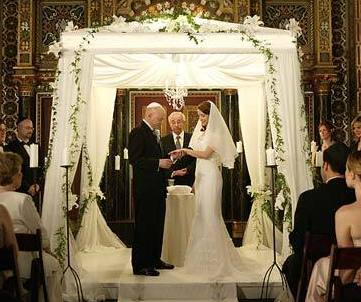
Pat, meanwhile, had her own agenda for the proceedings. She had no concerns whatsoever about Allegra’s ability
or anything else related to the concert. She was already being widely recognized as the official Allegra connection.
What she was focused on was another connection -- a potential shiddach (marital matchup) between Allegra and the
sax player, Brandon. Word was that Brandon was Jewish, too. So Pat was hoping that they’d end up truly making beautiful
music together. Never mind that Allegra already had a longtime boyfriend, and this was to be a purely professional liaison.
“Maybe they'll get married. If so, can I be the best man at their wedding?” she ventured
one night a few days in advance.
The most I hoped for was that they'd get through this evening
without incident and might even enjoy collaborating professionally enough to play together again. But I wasn’t
about to crush her greater expectations. “Sure,” I allowed. “If and when they get married, you can
be anything you want.”
Yet judging from the way the rehearsal
went, Pat wouldn’t be needing a tux just yet. The only sparks flying between them were ones of unspoken conflict.
Above board, everyone was perfectly cordial, of course. The problem was that Allegra is used to running her own show. Brandon
was clearly accustomed to running his, too. Would too many cooks spoil this soup?
As the vocalist, it normally fell to Allegra to remain in control of the microphone during concerts, introducing the band
members and songs and making any necessary banter in between. Yet Brandon made it clear that he intended to take charge and
perform all of these duties. And honestly, who could blame him? At 29, he had been performing professionally for years. She
was only 21, and all he knew about her was that she was fresh out of college and therefore probably greener than the
rolling hills of Vermont.
Then again, just imagine if he’d been hired to back up Nikki Yanofsky. As seasoned a performer and international
singing sensation as she may be, self-assured banter may not be her strong suit. She’s still only 16.
 Our plan was to drive up Friday afternoon the day before the performance so that Allegra could relax all day Saturday
before the event. First, though, she had to take a three-hour bus ride out of New York City. Then our four-hour drive commenced.
All the way up, through torrential rain and almost inpenetrable fog, she played one of Brandon Wright’s original songs
over and over again. They'd run through it once at the rehearsal, but she needed to commit it flawlessly to memory
by the next night. Our plan was to drive up Friday afternoon the day before the performance so that Allegra could relax all day Saturday
before the event. First, though, she had to take a three-hour bus ride out of New York City. Then our four-hour drive commenced.
All the way up, through torrential rain and almost inpenetrable fog, she played one of Brandon Wright’s original songs
over and over again. They'd run through it once at the rehearsal, but she needed to commit it flawlessly to memory
by the next night.
His plan, she said, was for the band to play four of his
original instrumental tunes, but he expected her to sing along on this one, performing a “wordless solo” to its
difficult melody as though she were another instrument. I heard her sing it so many times that I was almost ready to
perform it myself, if necessary. Still, I listened with rising skepticism about how it might be received by Pat and Company.
But I managed to keep my mouth shut.
Pat
had hoped to throw a big party that night in Allegra’s honor and introduce her to everyone she knew. Allegra had declined
this offer, though, in favor of a quiet Shabbat dinner. We arrived just in time to light the candles and sing a rousing
barucha and a motzi. My husband asked for butter to slather on the challah. That’s when we learned
that there’d been a big change in the household since our last visit there six months earlier.
In deference
to Pat and Michael’s youngest son, who was studying at a Yeshivah in Israel, they had chosen to start keeping a strictly
kosher home. This required more than simply making sure milk and meat remained separate during meals. They also
had begun to fastidiously maintain two separate sets of dishes, as well as different arsenals of serving bowls, flatware,
pots, and pans.
They’d tried to make this easy on both themselves and visitors by color-coding
many items. Milchedik (dairy) dishes were white, those meant for meat multicolored. Flayshedik utensils
(to be used for eating flesh) were marked with a band of red tape.
 I tried to keep this in mind while pitching in on the cleanup after dinner, but it was not an easy proposition for
a lifelong Reform Jew like me. When I began to clear the plates, Pat explained that only meat dishes could go into the dishwasher,
and all dairy items had to be washed by hand. Then when I began to scrub a bowl, I made a big gaffe. Michael calmly explained
that they also had two separate sponges, a pink one for all meat items and a blue one for dairy. I'd employed the wrong one.
Woops. Who knew? So much for being a good guest. I tried to keep this in mind while pitching in on the cleanup after dinner, but it was not an easy proposition for
a lifelong Reform Jew like me. When I began to clear the plates, Pat explained that only meat dishes could go into the dishwasher,
and all dairy items had to be washed by hand. Then when I began to scrub a bowl, I made a big gaffe. Michael calmly explained
that they also had two separate sponges, a pink one for all meat items and a blue one for dairy. I'd employed the wrong one.
Woops. Who knew? So much for being a good guest.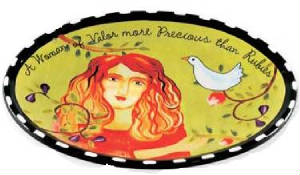
At
least Pat seemed to appreciate the assortment of food and gifts we’d brought, including a small oval dish imprinted
with the Biblical phrase “A woman of valor, more precious than rubies,” in honor of the “Woman of Valor”
award Pat had received in our community earlier this year. Flayshedik, I figured, looking at its brightly colored
pattern, showing a woman with long hair and a dove perched on an olive branch. But the next morning when I came down to breakfast,
she had used it to hold a brick of cream cheese. Go figure. I guess it was just the right size.
Another
must in the pursuit of good guest-liness is to be respectful of your hosts’ habits and try not to disrupt with
their customary routine in any way. So I urged Pat and Mike not to forego their usual Saturday morning bike ride,
which I was warned might go on for 30 miles and last for several hours. Yet I elected not to join them on it. For one thing,
the only bicycles I’ve ridden in the past four decades have pretty much been stationary ones at the gym. For another,
when I attend Allegra’s singing engagements, it may look like I’m enjoying myself, but I’m not just another
face in the crowd. As I said, I'm her mom-ager. No more of a highly paid position than being her nice Jewish mom, of
course. But as delighted as I am to be there, I’m actually working.
While
my husband went out to take a long walk and commune with the cows, I waited around till she woke up at 11 to make her
breakfast. Then I trailed her for the rest of the day, determined to keep her calm and relaxed. We happily joined
our hosts at a craft fair for the afternoon. But the minute Allegra announced that she’d had enough, I drove her home
so she could take a quick rest, then shower and get ready before her sound-check.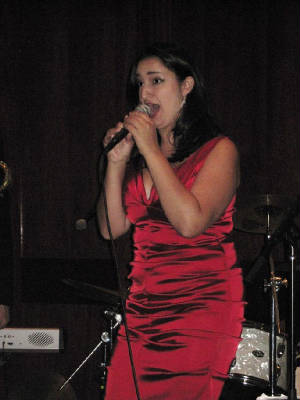
How
many women past college age have someone to help them dress, let alone such help from their mothers? But when you’re
a performer, it helps to have a second pair of hands, not to mention a personal assistant. Along with packing her red satin
dress, I’d brought along five pairs of glitzy earrings from which to choose. And when the dress proved to be a little
loose, I produced a dozen safety pins I’d brought along just in case and carefully pinned the straps up in back just
below the shoulders so any bunching would be hidden by her hair.
Then I drove her over to the
venue and raced back, only to realize that I now had five minutes left to shower and dress myself for the big event before
it was time to leave.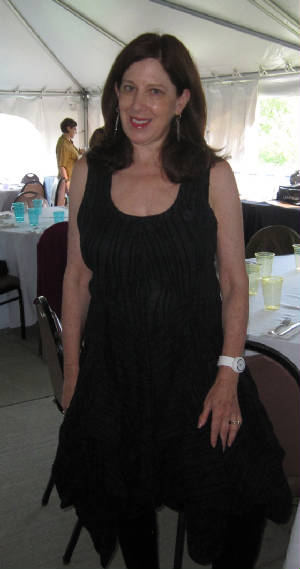
It sometimes troubles me that in our effort to attend most of our daughter’s appearances, we often end up spending
nearly as much as she’s getting paid. When she sings at that local restaurant each month, my husband and I often drop
the equivalent of more than half her paycheck on dinner. Fortunately, in the interests of making as great a profit as possible,
the gala organizers had chosen to keep costs down. The wildflowers on the dinner tables had been cut from Pat’s
own garden. And all the food had been prepared not by a caterer, but a small group of members in the center’s kosher
kitchen. This allowed them to keep ticket prices down – a modest $20 for the dinner plus another $35
for the show. That came to $110 per couple for the night, not exactly peanuts, but far below the typical
going rate for charitable events of any kind. No wonder it had managed to sell out.
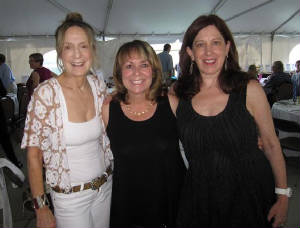 My only
obligation for the next hour or so was to socialize with Pat and Mike’s many friends, who couldn’t have been
nicer. I gladly posed for pictures with many of the women, one of whom insisted on splitting her glass of cabernet with me.
(Along with not being jazz lovers, these Jews were such light drinkers that the only one at the table who visited the cash
bar insisted on going halvesies and giving me the bigger half.) As we toasted each other, soundlessly clinking our plastic
tumblers, she confided that she wasn’t actually much of a jazz fiend herself, although she was a big fan of Nikki
Yanofsky’s. My only
obligation for the next hour or so was to socialize with Pat and Mike’s many friends, who couldn’t have been
nicer. I gladly posed for pictures with many of the women, one of whom insisted on splitting her glass of cabernet with me.
(Along with not being jazz lovers, these Jews were such light drinkers that the only one at the table who visited the cash
bar insisted on going halvesies and giving me the bigger half.) As we toasted each other, soundlessly clinking our plastic
tumblers, she confided that she wasn’t actually much of a jazz fiend herself, although she was a big fan of Nikki
Yanofsky’s.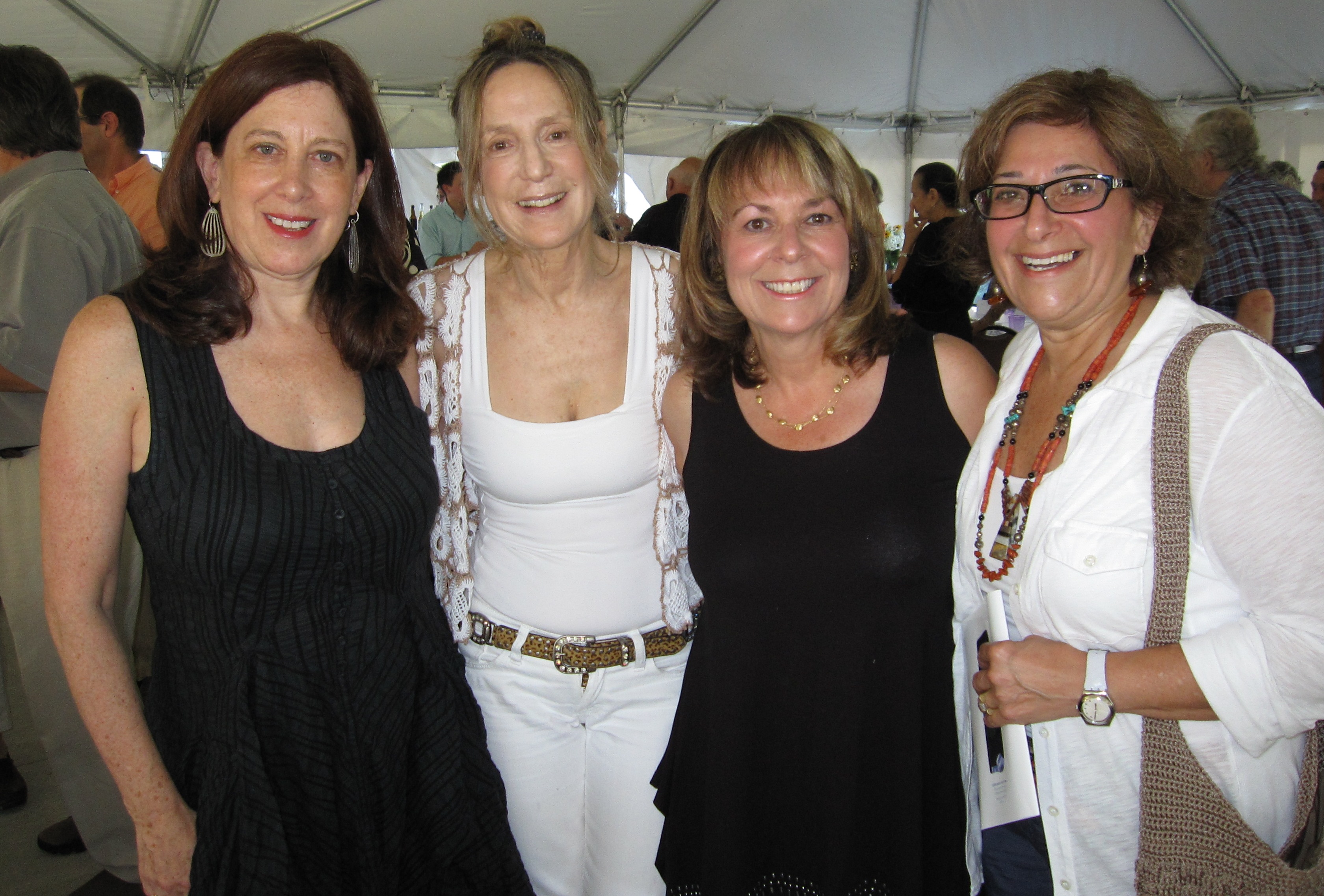
“I know her family, you know, so I've known Nikki since she was this high,” she explained,
holding a hand just above her knee.
I nodded, smiled and braced myself for my
worst nightmare to commence.
Half an hour before the concert was to begin, I had a moment of panic. Noting that the buffet table was almost cleared,
it crossed my mind that Allegra might not have eaten dinner. (I'm not just her mom-ager; I'm her mom.) Pat’s
friend Suzan assured me that all the performers had been fed earlier, but I knew better. Allegra never eats before
she sings. She’s much too nervous. Then afterwards, she’s ravenous. But I didn’t want to impose on Pat to
make her some dinner later on, and I didn't want to risk having her go hungry. So I filled a plate from the remains of the
buffet and put it into the fridge. Then, unable to find Allegra anywhere, I texted her. “Did you eat?”
“Not
really,” she wrote back. She hadn’t been able to get anything down.
I understood
perfectly. I’d been so anxious myself for the past three days that you'd think I really was expected to sing Brandon's
impossible wordless solo myself. I always fret before her performances about all the things that could go wrong. But
try as I might to prepare for every calamity – packing safety pins, extra nylons, cough drops and umbrellas, and
stashing grub for later – the fact is that I can’t sing for her. Nor can I prevent things from going wrong.
I can only help her to arrive on time with everything she needs, then watch her open her mouth and hope that the sound comes
out right.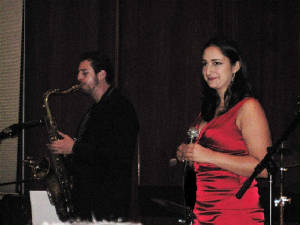
Finally, it was time for the show to begin. Everyone egressed
eagerly from the tent in which dinner had been served into the concert hall. The warm-up act, a pair of congregants and their
jazz group, finished up, and the band was introduced. According to the program, Brandon had already launched an illustrious
career, having won numerous awards, appeared everywhere from Jazz at Lincoln Center to the Tanglewood Jazz Festival, and performed
with many a household name, including Chuck Mangione, the Max Weinberg 7 and Tony Bennett. So it was no surprise that his
opening number, an original on which he improvised a solo at length, was impressive, ambitious, and dexterously executed
with many a fanciful riff.
And still I found myself looking at my watch halfway through, I must confess. Many of the codgers in the crowd looked
restless. The ones who were still awake, that is.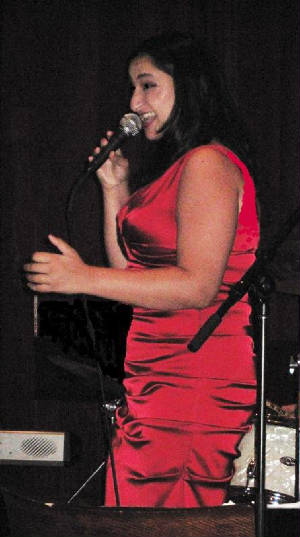
Allegra had told me that he planned to follow it up with another tune of similar ilk. So it was a great relief
when instead he seized the mic and announced her name, and she strode out, like a streak of red lipstick
crossing the stage, and eased her own mic out of its stand.
I was so paralyzed with fear that I couldn't breath.
I watched as she turned to the band and softly counted down the beat she wanted. Then she opened her mouth and began
to sing. Sound came out. Perfectly in tune.
People around me began to tap
their feet or drum their fingers, keeping the rhythm on their knees. She sounded better than ever. And I knew it was going
to be all right.
Did I say all right? Not just all right. Beyond. She
sounded better than ever. Better than "buttah." Was it possible that she had improved even since her senior
recital and college graduation barely three months ago? Hearing the mellowness and easy control in her voice
made me suddenly ashamed that I'd doubted her for a second.
"That's your daughter?" stage-whispered a woman seated to my husband's left after only a few bars.
"I can see she has a long career ahead of her. Oh, you must be so proud!"
After
her opener, "Taking a Chance on Love," she went straight into "Watch What Happens" from
Michel Legrande's classic French film "The Umbrellas of Cherbourg" -- both familiar tunes, although not necessarily
known to everyone. She'd had to forego some of her usual standards, like "My Romance" and "Moon River,"
because the band didn't know her own unique arrangements of them. But people seemed to swoon and remain
silently rapt when she seguéd into a gorgeous ballad she'd learned just for the occasion, "Moonlight in Vermont."
And when she announced that she was going to sing "It Don't Mean a Thing
If It Ain't Got that Swing" -- the Duke Ellington classic I'd suggested she substitute for her own choice,
the far more obscure "Thou Swell" -- the crowd erupted in enthusiastic cheers. At last something
everyone knew by heart.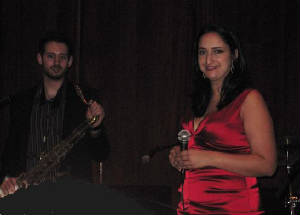
At intermission, several people were nice enough to come over and congratulate
us. But Pat and Mike were the ones who were inundated.
"Oh, she's wonderful,"
I heard someone say.
"Such talent," concurred another.
Pat beamed, not just the Connecticut connection, but talented by association.
Act
Two began with another instrumental number from the Brandon Wright songbook, and once again I must admit that I was impressed by
his proficiency yet lost and a little mystified. Then Allegra returned with the heart-rending song "In the Wee Small
Hours of the Morning," made famous by Frank Sinatra, and everything seemed to click again.
The crowd even sounded appreciative when the band navigated its way through her only original composition of the night, "I Don't
Want to Be in Love" (a rousing uptempo tune, although far from based in anything like reality).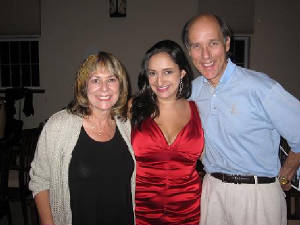
And so I began to realize that there weren't too many chefs cooking in this
kitchen after all. There may have been two different entrees on our concert plates -- as if we were
being served both milk and meat at once -- but in this case they belonged together and complimented each other perfectly.
I'm not saying Brandon is Mr. Wright for Allegra. Pat can probably put away her
tuxedo aspirations. But I do hope he and my daughter manage to get their professional acts together again. A match made
in heaven or not, they do make beautiful music together.
After the finale,
which prompted a thunderous standing ovation, we were surrounded once again.
"She's incredible," gushed a woman who'd confessed earlier that she had no interest whatsoever in jazz.
"You know Nikki Yanofsky?" asked another. "Well, I know Nikki
Yanofsky. I know her family, so I've known her since she was this high. She's wonderful. But your daughter? She's really something
else."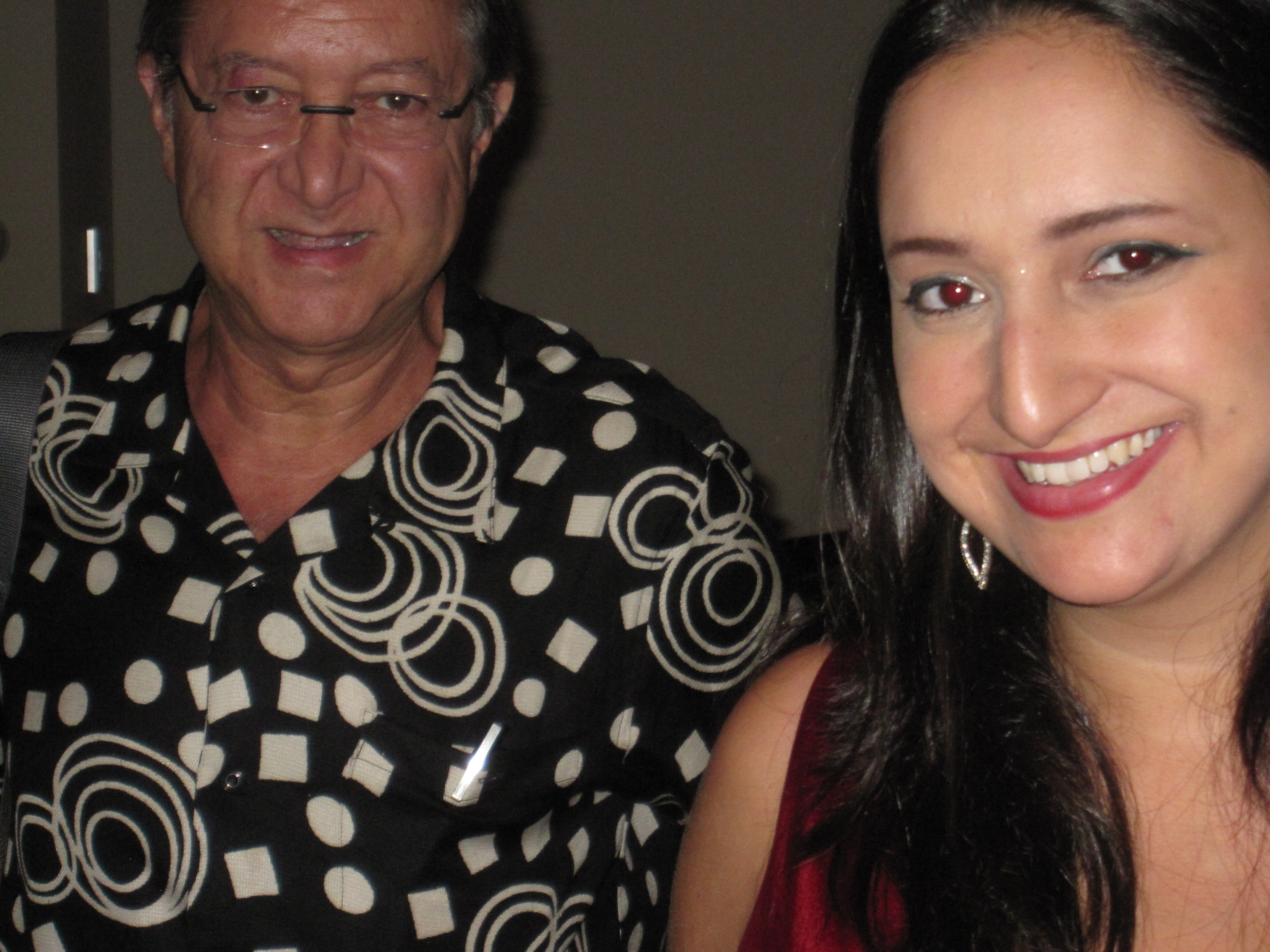
Back at the house afterwards, Allegra, ravenous as predicted, gobbled
down every morsel on the plate I'd prepared from the buffet. The rest of us feasted on the strawberries and shortcake biscuits I'd
brought as one of my offerings for the weekend. Then I valiantly tried to help clean up, but made the mistake this time
of drying the dishes with a black dish towel I'd found hanging from the stove. Pat pulled me aside and patiently showed
me that even the towels were color-coordinated -- white ones for the dairy dishes, dark or multicolored ones for
the meat.
So much for my efforts to be the perfect houseguest.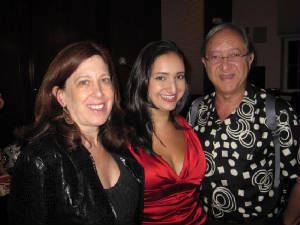 Curses. Foiled again. Curses. Foiled again.
In all honesty, I know that Pat and Michael
don't expect to be compensated for their hospitality. They invite us because they want to be with us. They're great people
and great friends. And their home away from home, Casa Kazakoff, as I call it, is so spacious that it feels cavernous
without company.
Still, I do want to offer something to show my gratitude,
and all things considered, I think we more than held up our end of the bargain. Pat was deluged with calls the next
day. She was the toast of the town.
Toast without butter, that is.
Also that morning, Suzan and Gary hosted Allegra and Brandon's band
for brunch and announced plans to book them for an even bigger venue in Stowe.
So I may have to continue boning up on the laws of milk, meat and maintaining kashrut. Maybe even learn to ride
a bicycle again. Whether or not we're ever able to reciprocate, it looks like we're going back.
To hear Allegra singing at the JCOGS gala on YouTube, click on
this link:
Allegra Levy +Brandon Wright Quartet Moonlight.MOV
11:59 pm
|
|
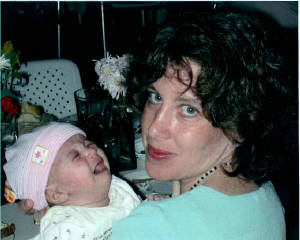
|
| That's me. The redhead on the right. But that is NOT my baby. |
No, sir, that's not
my baby. How could any mother smile beatifically while her own child wailed? Never mind that neither of my offspring
ever cried so plaintively, as far as I recall (not while I was there to nurture them through their every perceptible
need... although my son still complains that I often dressed him in garish and girlish color schemes, scarring him FOR LIFE). Besides, I'm distinctly beyond prime
delivery age ("Kitchen's closed!" as my mother might say), and my kids had departed the diaper stage by the
dawn of the Clinton Administration. Now in
their 20s, both are currently living on their
own, in not-too-distant cities, although each manages to phone me daily. In fact, to be exact, several times a
day, then sometimes text me, too. (That may sound excessive, and emotionally regressive, but I subscribe to
the Jewish mother's creed when it comes to conversing with kinder: Too much is never enough.)
Two demanding decades spent raising two kids who are kind, highly productive and multi-talented, who generally
wear clean underwear (as far as I can tell), and who by all visible signs don't detest me are my main credentials
for daring to dole out advice in the motherhood department.
Presenting myself as an authority on all matters Jewish may be trickier to justify. Yes, I was raised Jewish and am biologically an unadulterated, undisputable, purebred Yiddisheh
mama. I'm known for making a melt-in-your-mouth brisket, not to mention the world's airiest matzah
balls this side of Brooklyn. My longtime avocation is writing lyrics for Purim shpiels based on popular Broadway productions,
from "South Pers-cific" to "The Zion Queen." Then again, I'm no rabbi or Talmudic scholar. I
can't even sing "Hatikvah" or recite the Birkat Hamazon. Raised resoundingly Reform, I don't keep kosher, can
barely curse in Yiddish, and haven't set foot in Israel since I was a zaftig teen. Even so, as a longtime writer and ever-active
mother, I think I have something to say about being Jewish and a mom in these manic and maternally challenging
times. I hope something I say means something to you. Welcome to my nice Jewish world!
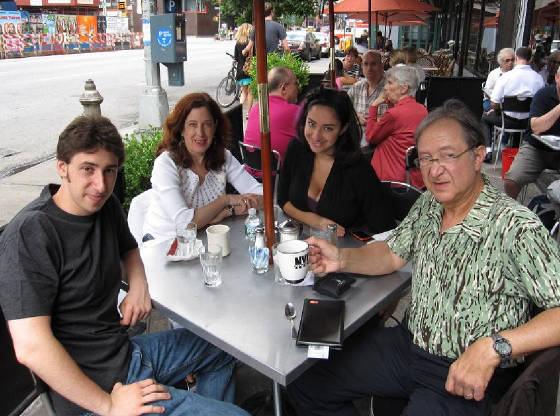
|
| LEVYS! MEET THE LEVYS! WE'RE A MODERN JEWISH FAMILY... |
In coming weeks, I will continue
posting more personal observations, rants, and even recipes (Jewish and otherwise). So keep reading, come back often,
and please tell all of your friends, Facebook buddies, and everyone else you know that NiceJewishMom.com is THE BOMB!
********************************************* The family that eats together (and maybe even Tweets together):
That's my son Aidan, me, my daughter Allegra, and Harlan, my husband for more than 26 years, all out for Sunday brunch on a nice summer weekend in New
York.

|
|
|